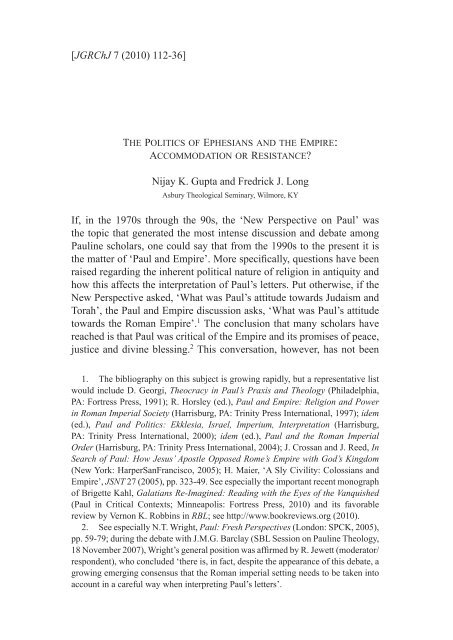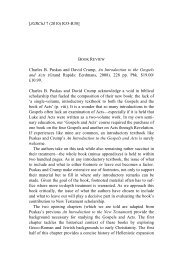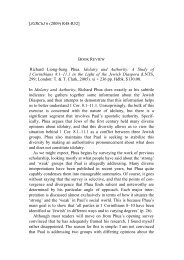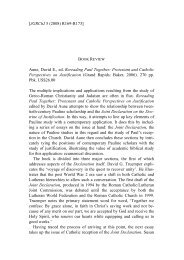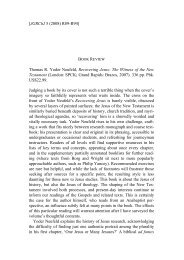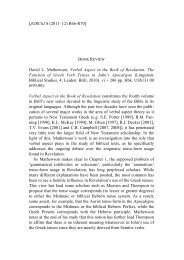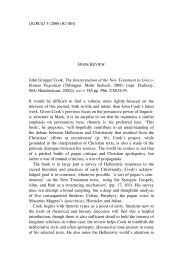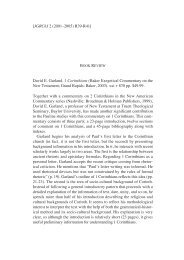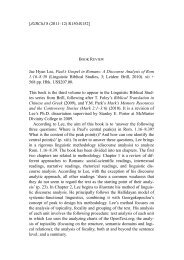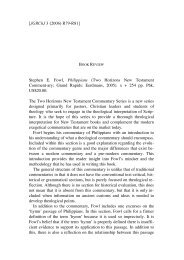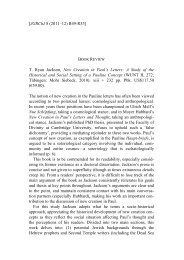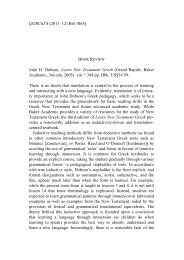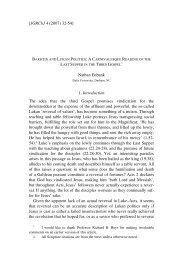The Politics of Ephesians and the Empire - Journal of Greco-Roman ...
The Politics of Ephesians and the Empire - Journal of Greco-Roman ...
The Politics of Ephesians and the Empire - Journal of Greco-Roman ...
You also want an ePaper? Increase the reach of your titles
YUMPU automatically turns print PDFs into web optimized ePapers that Google loves.
[JGRChJ 7 (2010) 112-36]<br />
<strong>The</strong> <strong>Politics</strong> <strong>of</strong> <strong>Ephesians</strong> <strong>and</strong> <strong>the</strong> <strong>Empire</strong>:<br />
Accommodation or Resistance?<br />
Nijay K. Gupta <strong>and</strong> Fredrick J. Long<br />
Asbury <strong>The</strong>ological Seminary, Wilmore, KY<br />
If, in <strong>the</strong> 1970s through <strong>the</strong> 90s, <strong>the</strong> ‘New Perspective on Paul’ was<br />
<strong>the</strong> topic that generated <strong>the</strong> most intense discussion <strong>and</strong> debate among<br />
Pauline scholars, one could say that from <strong>the</strong> 1990s to <strong>the</strong> present it is<br />
<strong>the</strong> matter <strong>of</strong> ‘Paul <strong>and</strong> <strong>Empire</strong>’. More specifically, questions have been<br />
raised regarding <strong>the</strong> inherent political nature <strong>of</strong> religion in antiquity <strong>and</strong><br />
how this affects <strong>the</strong> interpretation <strong>of</strong> Paul’s letters. Put o<strong>the</strong>rwise, if <strong>the</strong><br />
New Perspective asked, ‘What was Paul’s attitude towards Judaism <strong>and</strong><br />
Torah’, <strong>the</strong> Paul <strong>and</strong> <strong>Empire</strong> discussion asks, ‘What was Paul’s attitude<br />
towards <strong>the</strong> <strong>Roman</strong> <strong>Empire</strong>’. 1 <strong>The</strong> conclusion that many scholars have<br />
reached is that Paul was critical <strong>of</strong> <strong>the</strong> <strong>Empire</strong> <strong>and</strong> its promises <strong>of</strong> peace,<br />
justice <strong>and</strong> divine blessing. 2 This conversation, however, has not been<br />
1. <strong>The</strong> bibliography on this subject is growing rapidly, but a representative list<br />
would include D. Georgi, <strong>The</strong>ocracy in Paul’s Praxis <strong>and</strong> <strong>The</strong>ology (Philadelphia,<br />
PA: Fortress Press, 1991); R. Horsley (ed.), Paul <strong>and</strong> <strong>Empire</strong>: Religion <strong>and</strong> Power<br />
in <strong>Roman</strong> Imperial Society (Harrisburg, PA: Trinity Press International, 1997); idem<br />
(ed.), Paul <strong>and</strong> <strong>Politics</strong>: Ekklesia, Israel, Imperium, Interpretation (Harrisburg,<br />
PA: Trinity Press International, 2000); idem (ed.), Paul <strong>and</strong> <strong>the</strong> <strong>Roman</strong> Imperial<br />
Order (Harrisburg, PA: Trinity Press International, 2004); J. Crossan <strong>and</strong> J. Reed, In<br />
Search <strong>of</strong> Paul: How Jesus’ Apostle Opposed Rome’s <strong>Empire</strong> with God’s Kingdom<br />
(New York: HarperSanFrancisco, 2005); H. Maier, ‘A Sly Civility: Colossians <strong>and</strong><br />
<strong>Empire</strong>’, JSNT 27 (2005), pp. 323-49. See especially <strong>the</strong> important recent monograph<br />
<strong>of</strong> Brigette Kahl, Galatians Re-Imagined: Reading with <strong>the</strong> Eyes <strong>of</strong> <strong>the</strong> Vanquished<br />
(Paul in Critical Contexts; Minneapolis: Fortress Press, 2010) <strong>and</strong> its favorable<br />
review by Vernon K. Robbins in RBL; see http://www.bookreviews.org (2010).<br />
2. See especially N.T. Wright, Paul: Fresh Perspectives (London: SPCK, 2005),<br />
pp. 59-79; during <strong>the</strong> debate with J.M.G. Barclay (SBL Session on Pauline <strong>The</strong>ology,<br />
18 November 2007), Wright’s general position was affirmed by R. Jewett (moderator/<br />
respondent), who concluded ‘<strong>the</strong>re is, in fact, despite <strong>the</strong> appearance <strong>of</strong> this debate, a<br />
growing emerging consensus that <strong>the</strong> <strong>Roman</strong> imperial setting needs to be taken into<br />
account in a careful way when interpreting Paul’s letters’.
Gupta & Long <strong>Politics</strong> <strong>of</strong> <strong>Ephesians</strong> <strong>and</strong> <strong>the</strong> <strong>Empire</strong> 113<br />
limited to <strong>the</strong> study <strong>of</strong> Paul. Similar reflections have taken place with<br />
respect to Mat<strong>the</strong>w, 3 John 4 <strong>and</strong> <strong>the</strong> book <strong>of</strong> Revelation, 5 to name only a<br />
few.<br />
Although some commentary writers have explicitly noted <strong>the</strong><br />
political import <strong>of</strong> parts <strong>of</strong> <strong>Ephesians</strong>—e.g. Marcus Barth, <strong>and</strong> more<br />
recently <strong>and</strong> extensively, Charles H. Talbert 6 —fuller treatments <strong>of</strong> this<br />
dimension tend to be restricted to 2.11-22 as seen in Peter Stuhlmacher,<br />
Eberhard Faust, Gosnell Yorke <strong>and</strong> Te-Li Lau. 7 Still, complete treatments<br />
3. See W. Carter, Mat<strong>the</strong>w <strong>and</strong> <strong>Empire</strong>: Initial Explorations (Harrisburg, PA:<br />
Trinity Press International, 2001).<br />
4. See W. Carter, John <strong>and</strong> <strong>Empire</strong> (New York: T. & T. Clark, 2008).<br />
5. See W. Howard-Brook <strong>and</strong> A. Gwy<strong>the</strong>r, Unveiling <strong>Empire</strong>: Rereading<br />
Revelation <strong>The</strong>n <strong>and</strong> Now (Maryknoll, NY: Orbis Books, 1999); S. Friesen, Imperial<br />
Cults <strong>and</strong> <strong>the</strong> Apocalypse <strong>of</strong> John: Reading Revelation in <strong>the</strong> Ruins (Oxford: Oxford<br />
University Press, 2006).<br />
6. See, e.g., <strong>the</strong> sporadic comments on <strong>the</strong> more politically explicit material in<br />
<strong>Ephesians</strong> (Christ seated at <strong>the</strong> right h<strong>and</strong>, Christ bringing peace, etc.) in M. Barth,<br />
<strong>Ephesians</strong> 1–3 (AB; New York: Doubleday, 1974), as he explores various possible<br />
backgrounds; also C.H. Talbert, <strong>Ephesians</strong> <strong>and</strong> Colossians (Paideia: Commentaries on<br />
<strong>the</strong> New Testament; Gr<strong>and</strong> Rapids: Baker, 2007), interprets in ancient political terms<br />
Christ’s bringing peace as Augustan-like (p. 82), <strong>the</strong> body/head language as used by<br />
Seneca <strong>and</strong> Rome/Nero (pp. 86-88), <strong>the</strong> Christian community’s growth into Christ as<br />
<strong>the</strong> ideal ruler (pp. 115-17); however, while discussing <strong>the</strong> <strong>Greco</strong>-<strong>Roman</strong> background<br />
to <strong>the</strong> household codes (pp. 136-39) <strong>and</strong> <strong>the</strong> donning <strong>of</strong> God’s armor (p. 159), Talbert<br />
does not sufficiently correlate <strong>the</strong>se <strong>the</strong>mes to <strong>the</strong> larger political thrust <strong>of</strong> <strong>Ephesians</strong>,<br />
which he certainly underst<strong>and</strong>s: ‘<strong>Ephesians</strong> sets forward <strong>the</strong> Christian community as<br />
equivalent to <strong>the</strong> state, a counterculture over against <strong>the</strong> state…’ (p. 88). Lacking in<br />
Barth <strong>and</strong> Talbert is an underst<strong>and</strong>ing <strong>of</strong> how <strong>Ephesians</strong> addresses <strong>the</strong> socio-religiouspolitical<br />
needs <strong>of</strong> Christ followers in Asia Minor in <strong>the</strong> mid-first century.<br />
7. Peter Stuhlmacher, ‘“He is our Peace” (Eph. 2:14): On <strong>the</strong> Exegesis <strong>and</strong><br />
Significance <strong>of</strong> <strong>Ephesians</strong> 2:14-18’, in his Reconciliation, Law, <strong>and</strong> Righteousness:<br />
Essays in Biblical <strong>The</strong>ology (Philadelphia: Fortress Press, 1986), pp. 182-200; Eberhard<br />
Faust, Pax Christi et Pax Caesaris: Religionsgeschichtliche, traditionsgeschichtliche<br />
und sozialgeschichtliche Studien zum Epheserbrief (NTOA, 24; Freiburg: Freiburg<br />
Universitätsverlag, 1993), who views <strong>Ephesians</strong> as pseudepigraphic <strong>and</strong> dated at <strong>the</strong><br />
end <strong>of</strong> <strong>the</strong> first century; he concludes that <strong>the</strong> political background <strong>and</strong> nature <strong>of</strong><br />
2.11-22 comes from Jewish-gnostic influence (in comparison with Philo), but <strong>the</strong>n<br />
is constructed in view <strong>of</strong> <strong>Roman</strong> imperial ideology (see esp. pp. 221-314; cf. Rainer<br />
Schwindt, Das Weltbild des Epheserbriefes: Eine religionsgeschichtlich-exegetische<br />
Studie [WUNT, 2.148; Tübingen: Mohr Siebeck, 2002], <strong>and</strong> Gerhard Sellin, Der<br />
Brief an die Epheser [MeyerK; Göttingen: V<strong>and</strong>enhoeck & Ruprecht, 2008], who<br />
both likewise underst<strong>and</strong> <strong>the</strong> epistle as deutero-Pauline); Gosnell Yorke, ‘Hearing <strong>the</strong><br />
<strong>Politics</strong> <strong>of</strong> Peace in <strong>Ephesians</strong>: A Proposal from an African Postcolonial Perspective’,
114 <strong>Journal</strong> <strong>of</strong> <strong>Greco</strong>-<strong>Roman</strong> Christianity <strong>and</strong> Judaism 7<br />
<strong>of</strong> <strong>the</strong> politics <strong>of</strong> <strong>Ephesians</strong> are ra<strong>the</strong>r rare. 8 Fur<strong>the</strong>rmore, <strong>the</strong> fact that<br />
<strong>Ephesians</strong> is generally considered by scholars to be pseudonymous has<br />
<strong>of</strong>ten obviated its treatment as a representation <strong>of</strong> Paul’s thought.<br />
Most notable among <strong>the</strong>se latter interpreters is Neil Elliott, who<br />
describes <strong>Ephesians</strong> (as well as Colossians <strong>and</strong> <strong>the</strong> Pastoral Epistles) as<br />
part <strong>of</strong> a ‘canonical betrayal’ whereby later Paulinists framed <strong>the</strong> apostle<br />
to be a social conservative with <strong>the</strong> purpose <strong>of</strong> conforming to <strong>the</strong> values<br />
<strong>and</strong> structures <strong>of</strong> <strong>the</strong> <strong>Roman</strong> <strong>Empire</strong>. 9 Elliott is not alone in holding this<br />
negative political evaluation <strong>of</strong> <strong>Ephesians</strong>. 10 If <strong>the</strong> question were posed,<br />
‘Does <strong>Ephesians</strong> promote accommodation or resistance to <strong>the</strong> <strong>Empire</strong>?’,<br />
many scholars would claim <strong>the</strong> former without hesitation. Appeal for this<br />
position is quickly made to <strong>the</strong> presence <strong>of</strong> a household code (5.21–6.9)<br />
<strong>and</strong> to issues such as <strong>the</strong> cosmological focus <strong>and</strong> <strong>the</strong> ostensible absence<br />
<strong>of</strong> overt subversive political language. However, labeling <strong>Ephesians</strong> as<br />
‘accommodationistic’ is quite simplistic, <strong>and</strong> can only be sustained by<br />
holding to a superficial reading <strong>of</strong> <strong>the</strong> text. 11<br />
In this article we wish to argue that, when a close reading <strong>of</strong> <strong>Ephesians</strong><br />
is sustained on its own terms <strong>and</strong> not as part <strong>of</strong> a deutero-Pauline canon,<br />
JSNT 30 (2007), pp. 113-27; Te-Li Lau, <strong>The</strong> <strong>Politics</strong> <strong>of</strong> Peace: <strong>Ephesians</strong>, Dio<br />
Chrysostom, <strong>and</strong> <strong>the</strong> Confucian Four Books (NovTSup, 133; Leiden: E.J. Brill,<br />
2009), whose study <strong>of</strong> peace <strong>and</strong> unity extends beyond 2.11-22 <strong>and</strong> who holds to<br />
Pauline authorship in <strong>the</strong> early 60s, although methodologically due to <strong>the</strong> letter’s<br />
general nature does not attempt any historical reconstruction (p. 25).<br />
8. But, see J. Bird, ‘<strong>Ephesians</strong>’, in F. Segovia (ed.), A Postcolonial Commentary<br />
on <strong>the</strong> New Testament Writings (London: T. & T. Clark, 2007), pp. 265-80; <strong>and</strong> F.J.<br />
Long, ‘<strong>Ephesians</strong>: Paul’s Political <strong>The</strong>ology in <strong>Greco</strong>-<strong>Roman</strong> Political Context’, in<br />
S. E. Porter <strong>and</strong> A. Pitts (eds.), Christian Origins <strong>and</strong> Classical Culture: Social <strong>and</strong><br />
Literary Contexts for <strong>the</strong> New Testament (E.J. Brill, forthcoming).<br />
9. See N. Elliott, Liberating Paul: <strong>The</strong> Justice <strong>of</strong> God <strong>and</strong> <strong>the</strong> <strong>Politics</strong> <strong>of</strong> <strong>the</strong><br />
Apostle (Sheffield: Sheffield Academic Press, 1995), particularly pp. 25-54; see also<br />
idem, ‘<strong>The</strong> Apostle Paul <strong>and</strong> <strong>Empire</strong>’, in R. Horsley (ed.), In <strong>the</strong> Shadow <strong>of</strong> <strong>Empire</strong>:<br />
Reclaiming <strong>the</strong> Bible as a History <strong>of</strong> Faithful Resistance (Louisville, KY: Westminster<br />
John Knox Press, 2008), pp. 97-116.<br />
10. Cf. A.K. Grieb, ‘Colossians, <strong>Ephesians</strong>, <strong>and</strong> <strong>the</strong> Pastoral Epistles’, in W.<br />
Howard-Brook <strong>and</strong> S.H. Ringe (eds.), <strong>The</strong> New Testament— Introducing <strong>the</strong> Way <strong>of</strong><br />
Discipleship (Maryknoll, NY: Orbis Books, 2002), pp. 148-67; Crossan <strong>and</strong> Reed,<br />
In Search <strong>of</strong> Paul; Bird, ‘<strong>Ephesians</strong>’.<br />
11. This is seen, e.g., in Bird, ‘<strong>Ephesians</strong>’, who insightfully sees many <strong>of</strong> <strong>the</strong> political<br />
parallels to <strong>Roman</strong> imperial ideology, but fails to underst<strong>and</strong> how <strong>the</strong>se are subverted<br />
by <strong>the</strong> argumentation <strong>of</strong> <strong>Ephesians</strong>. Instead, Bird interprets <strong>Ephesians</strong> as re-inscribing<br />
empire <strong>and</strong> hierarchy <strong>and</strong> thus, e.g., <strong>the</strong> perpetual subordination <strong>of</strong> women to men.
Gupta & Long <strong>Politics</strong> <strong>of</strong> <strong>Ephesians</strong> <strong>and</strong> <strong>the</strong> <strong>Empire</strong> 115<br />
<strong>the</strong> evidence for accommodation is not as secure as Elliott <strong>and</strong> o<strong>the</strong>rs<br />
have indicated. In fact, <strong>the</strong> particular language <strong>of</strong> <strong>Ephesians</strong> shows many<br />
signs <strong>of</strong> counter-imperial resistance by affirming <strong>the</strong> establishment <strong>of</strong> an<br />
alternative political identity in <strong>the</strong> church assembly around Jesus Christ<br />
as <strong>the</strong> one Lord (4.5). Such a God-ordained body politic with its reigning<br />
Lord trumps, while subverting, <strong>Roman</strong> imperial prerogatives, positions<br />
<strong>and</strong> even specific titulature. <strong>The</strong>se claims are supported through studying<br />
closely <strong>the</strong> precise language, structure <strong>and</strong> rhetoric <strong>of</strong> <strong>Ephesians</strong> <strong>and</strong><br />
considering how <strong>the</strong> original author would have intended readers to<br />
recognize allusions to imperial <strong>the</strong>mes, titles <strong>and</strong> cultic imagery, which<br />
merged spiritual-heavenly <strong>and</strong> earthly realms. Through considering <strong>the</strong><br />
Household Codes (5.23–6.9) <strong>and</strong> those passages referring to rule(rs) <strong>and</strong><br />
authorities that disclose a cosmology <strong>and</strong> an apocalyptic worldview (1.15-<br />
23; 2.1-3; 3.10; 6.10-13), we will argue that <strong>Ephesians</strong> provides both a<br />
trumping critique <strong>of</strong> <strong>Roman</strong> imperial ideology <strong>and</strong> an ethical critique <strong>of</strong><br />
<strong>the</strong> predominant social values.<br />
Cosmology <strong>and</strong> Apocalyptic Worldview in <strong>Ephesians</strong><br />
One major plank in Elliott’s argument that <strong>Ephesians</strong> is imperially<br />
accommodationistic involves <strong>the</strong> letter’s cosmological <strong>and</strong> apocalyptic<br />
perspective. Elliott highlights, first, that one could perceive <strong>of</strong> <strong>the</strong><br />
constant appeal to spiritual powers in <strong>Ephesians</strong> as supporting a kind <strong>of</strong><br />
transcendentalism that makes <strong>the</strong> enemies non-earthly <strong>and</strong>, thus, believers<br />
should not bo<strong>the</strong>r being concerned with <strong>the</strong> emperor. But, secondly, even<br />
if <strong>the</strong> earthly powers are being implicated in <strong>the</strong> language in <strong>Ephesians</strong>,<br />
<strong>the</strong> notion that all are currently ‘subject’ to Christ could lead one to<br />
believe that what is happening in <strong>the</strong> empire is under <strong>the</strong> authority <strong>of</strong><br />
Christ. Elliott explains it in this way:<br />
[<strong>The</strong> <strong>the</strong>ology <strong>of</strong> <strong>Ephesians</strong> <strong>and</strong> Colossians] is inherently liable to an<br />
o<strong>the</strong>rworldly spiritualization that distracts us from <strong>the</strong> web <strong>of</strong> this-worldly<br />
power relations, or baptizes those power relations as already ‘obedient’ to<br />
Christ. 12<br />
<strong>The</strong> consequence [<strong>of</strong> <strong>the</strong> influence <strong>of</strong> <strong>the</strong>se texts] is that <strong>the</strong> language<br />
<strong>of</strong> Christ’s present lordship over <strong>the</strong> powers now too readily yields <strong>the</strong><br />
interpretation that <strong>the</strong> Powers somehow enjoy God’s blessings now. 13<br />
12. Elliott, Liberating Paul, p. 120.<br />
13. Elliott, Liberating Paul, p. 120.
116 <strong>Journal</strong> <strong>of</strong> <strong>Greco</strong>-<strong>Roman</strong> Christianity <strong>and</strong> Judaism 7<br />
In order to evaluate Elliott’s claims, we need to discuss those passages<br />
in <strong>Ephesians</strong> that refer to ‘rulers’ <strong>and</strong> ‘powers’; namely, 1.15-23, 2.1-3,<br />
3.10 <strong>and</strong> 6.10-13.<br />
In Eph. 1.19-21, mention is made <strong>of</strong> <strong>the</strong> power <strong>of</strong> God that raised<br />
Christ up to be seated in <strong>the</strong> heavenly places ‘far above all rule <strong>and</strong><br />
authority <strong>and</strong> power <strong>and</strong> dominion, <strong>and</strong> above every name that is named,<br />
not only in this age but also in <strong>the</strong> age to come’ (1.21 nrsv). At first<br />
glance, one may assume that this list involves spiritual forces that hold<br />
sway over <strong>the</strong> world. 14 However, an important point should be made<br />
about <strong>the</strong> worldview <strong>of</strong> most people in <strong>the</strong> ancient world: ‘Nothing in<br />
heaven can happen without pr<strong>of</strong>ound repercussions on earth; indeed,<br />
that is <strong>the</strong> way true change on earth is brought about.’ 15 That is, <strong>the</strong><br />
‘happenings’ <strong>of</strong> heaven <strong>and</strong> earth are so intertwined that one can hardly<br />
refer to one without drawing in <strong>the</strong> o<strong>the</strong>r. Indeed, when one looks<br />
closely at <strong>the</strong> terminology used in 1.21 over which Christ Jesus is set—<br />
‘above every ruler, authority, power, <strong>and</strong> lordship <strong>and</strong> every name being<br />
named’ (u9pera&nw pa&shj a)rxh=j kai\ e0cousi/aj kai\ duna&mewj kai\<br />
kurio/thtoj kai\ panto\j o0no/matoj o0nomazome/nou)—<strong>the</strong> language is,<br />
first <strong>of</strong> all, inclusive in scope (‘every’) <strong>and</strong> thus applicable to human<br />
<strong>and</strong> spiritual entities. Secondly, such terms as a)rxh/, e0cousi/a <strong>and</strong><br />
kurio/thj would have commonly <strong>and</strong> easily evoked images <strong>of</strong> earthly<br />
governance. 16 Put ano<strong>the</strong>r way, given <strong>the</strong> use <strong>of</strong> <strong>the</strong>se terms in legal<br />
14. See Andrew T. Lincoln, <strong>Ephesians</strong> (WBC, 42; Dallas: Word, 2002), pp. 62-<br />
76; <strong>and</strong> C. Arnold, Powers <strong>of</strong> Darkness: Principalities <strong>and</strong> Powers in Paul’s Letters<br />
(Downers Grove, IL: InterVarsity Press, 1992), p. 107.<br />
15. W. Wink, Engaging <strong>the</strong> Powers: Discernment <strong>and</strong> Resistance in a World <strong>of</strong><br />
Domination (Minneapolis: Fortress Press, 1992), p. 60.<br />
16. <strong>The</strong> first two listed positions—a)rxh/ <strong>and</strong> e0cousi/a—are well-known terms<br />
<strong>of</strong> earthly political import, being part <strong>of</strong> equivalent Greek expressions <strong>of</strong> Latin ones<br />
referring to <strong>Roman</strong> imperial power, governing <strong>of</strong>ficials <strong>and</strong> political positions; see<br />
David Magie , ‘I. Index Vocabulorum Graecorum (Index <strong>of</strong> Greek Words)’, in his De<br />
<strong>Roman</strong>orum Iuris Publici Sacrique Vocabulis Sollemnibus in Graecum Sermonem<br />
Conversis [On <strong>the</strong> Customary Nomenclature <strong>of</strong> Public <strong>and</strong> Religious Authority <strong>of</strong><br />
<strong>the</strong> <strong>Roman</strong>s Translated in <strong>the</strong> Greek Language] (Biblio<strong>the</strong>ca Scriptorum Graecorum<br />
et <strong>Roman</strong>orum Teubneriana; Lipsiae: Teubner, 1905), pp. 155-76 (156 <strong>and</strong> 160<br />
respectively). This is a list that allows one to locate <strong>the</strong> specific Latin equivalents<br />
<strong>and</strong> <strong>the</strong>ir sources in inscriptions <strong>and</strong> literature. For a chart <strong>of</strong> <strong>the</strong>se occurrences <strong>and</strong><br />
Greek <strong>and</strong> Latin titles, see F.J. Long, ‘<strong>Roman</strong> Imperial Rule under <strong>the</strong> Authority<br />
<strong>of</strong> Jupiter-Zeus: Political-Religious Contexts <strong>and</strong> <strong>the</strong> Interpretation <strong>of</strong> “<strong>the</strong> Ruler<br />
<strong>of</strong> <strong>the</strong> Authority <strong>of</strong> <strong>the</strong> Air” in <strong>Ephesians</strong> 2:2’, in S.E. Porter <strong>and</strong> A. Pitts (eds.),<br />
<strong>The</strong> Language <strong>of</strong> <strong>the</strong> New Testament: Context, History <strong>and</strong> Development (Linguistic
Gupta & Long <strong>Politics</strong> <strong>of</strong> <strong>Ephesians</strong> <strong>and</strong> <strong>the</strong> <strong>Empire</strong> 117<br />
<strong>and</strong> political discourses more generally, <strong>the</strong> author <strong>of</strong> <strong>Ephesians</strong>, even<br />
when referring to spiritual powers, ‘may have thought specifically <strong>of</strong><br />
<strong>the</strong>ir earthly representatives’. 17<br />
<strong>The</strong> trumping nature <strong>of</strong> God’s work is evident in Christ’s position<br />
‘far above’ (u9pera&nw) every position <strong>and</strong> every ‘name being named’<br />
(1.21). <strong>The</strong> supremacy <strong>of</strong> Christ’s rule using u9pe/r or u9pera&nw continues<br />
in 1.22, 4.10 <strong>and</strong> 5.20, just as does God’s supremacy <strong>of</strong> power<br />
(1.19; 3.20) <strong>and</strong> ‘wealth <strong>of</strong> favor’ (2.7). Indeed, God <strong>the</strong> Fa<strong>the</strong>r is<br />
presented as <strong>the</strong> greatest benefactor (1.3-14; 2.4-10, etc.), which<br />
would have challenged any human or deity from making that claim.<br />
<strong>The</strong> possession <strong>and</strong> bestowal <strong>of</strong> wealth, grace/favor <strong>and</strong> mercy were<br />
especially <strong>the</strong> jurisdiction <strong>of</strong> <strong>the</strong> gods <strong>and</strong> <strong>the</strong> emperor. Indeed, it was<br />
argued that ‘Caesar owned all things’ (Seneca, Ben. 7.5.3); ‘whatever<br />
exists beneath Jupiter on high, Caesar possesses’ (Ovid, Fast. 2.138),<br />
‘for <strong>the</strong> emperor is <strong>the</strong> state’ (Ovid, Tris. 4.15). 18 Augustus listed his<br />
benefactions in thirty-five paragraphs in his Res Gestae, published on<br />
his dual-columned memorial. Philo (Flacc. 74) could call Augustus<br />
‘savior <strong>and</strong> benefactor’ (o9 swth\r kai\ eu0erge/thj Sebasto/j). <strong>The</strong><br />
role <strong>of</strong> being <strong>the</strong> greatest benefactor <strong>of</strong> <strong>the</strong> human race was continued<br />
in <strong>the</strong> Caesar Nero, who at Ptolemais in 60–61 ce was praised as<br />
‘<strong>the</strong> savior <strong>and</strong> benefactor <strong>of</strong> <strong>the</strong> inhabited world’ (tw~i swth=ri kai\<br />
eu0erge/thi th=j oi0koume/nhj). 19<br />
Fur<strong>the</strong>rmore, <strong>the</strong> ‘naming’ <strong>of</strong> Eph. 1.21 relates to social constructs<br />
<strong>of</strong> identification. 20 As Wesley Carr argues, <strong>the</strong> use <strong>of</strong> o1noma/o0noma&zw<br />
Biblical Studies; Leiden: E.J. Brill, forthcoming). For a0rxh/ <strong>and</strong> cognates see also<br />
H.J. Mason, Greek Terms for <strong>Roman</strong> Institutions: A Lexicon <strong>and</strong> Analysis (American<br />
Studies in Papyrology, 13; Toronto: Hakkert, 1974), pp. 110-15, 138-40, <strong>and</strong> for<br />
e0cousi/a, pp. 132-34. <strong>The</strong> term kra&toj ‘might’ in Eph. 1.19 is also used <strong>of</strong> ‘<strong>the</strong><br />
<strong>Roman</strong> imperium (power)’: to\ tw~n ‘Rwmai/wn kra&toj <strong>and</strong> to\ kra&toj to\ tw~n<br />
‘Rwmai/wn (Magie, De <strong>Roman</strong>orum, p. 58).<br />
17. Barth, <strong>Ephesians</strong> 1-3, p. 174; see pp. 171-76. Similarly, see P.T. O’Brien,<br />
<strong>Ephesians</strong> (Pillar; Gr<strong>and</strong> Rapids: Eerdmans, 1999), p. 144.<br />
18. Texts quoted from R. MacMullen, ‘Personal Power in <strong>the</strong> <strong>Roman</strong> <strong>Empire</strong>’,<br />
AJP 107 (1986), pp. 512-24 (520 n. 24).<br />
19. OGIS 668; cf. discussion in J.J. Collins, <strong>The</strong> Sibylline Oracles <strong>of</strong> Egyptian<br />
Judaism (Missoula, MT: SBL, 1974), pp. 81-82.<br />
20. Except for Acts 19.13 (in which <strong>the</strong> verb <strong>and</strong> noun are used with a magical<br />
sense), all o<strong>the</strong>r New Testament instances <strong>of</strong> <strong>the</strong> verb o0noma/zw involve social <strong>and</strong><br />
moral constructs <strong>of</strong> identification (Mk 3.14; Lk. 6.13-14; Rom. 15.20; 1 Cor. 5.11;<br />
Eph. 1.21; 3.15; 5.3; 2 Tim. 2.19).
118 <strong>Journal</strong> <strong>of</strong> <strong>Greco</strong>-<strong>Roman</strong> Christianity <strong>and</strong> Judaism 7<br />
signifies ‘title’ or ‘dignity’ in an abstract sense, <strong>and</strong> this sense would apply<br />
to <strong>the</strong> o<strong>the</strong>r terms in <strong>the</strong> list. 21 When ‘naming’ is associated with titles <strong>of</strong><br />
political position, such naming arguably refers to <strong>the</strong> publically visible<br />
<strong>and</strong> widespread onomastic practice <strong>of</strong> amassing (repeated) <strong>and</strong> diverse<br />
titles to <strong>the</strong> emperors on monumentation <strong>and</strong> coinage. For instance,<br />
Augustus’s last complete title was Imperator Caesar Divi Filius Augustus,<br />
Pontifex Maximus, Consul XIII, Imperator XXI, Tribuniciae Potestatis<br />
XXXVII, Pater Patriae—<strong>the</strong> <strong>Roman</strong> numerals indicating <strong>the</strong> number <strong>of</strong><br />
times each title was credited. <strong>The</strong> citizenry was ever accustomed to this<br />
practice applied to <strong>the</strong> emperors. Likewise, for example, Alex<strong>and</strong>rian<br />
coinage (billon tetradrachm) in 58–59 ce depicts on <strong>the</strong> obverse Nero<br />
with laureate head <strong>and</strong> NERW KLAD KAI SEBA GER AUTO (‘Nero<br />
Claudius Caesar Sebastos Germanicus Autokrater’) <strong>and</strong> on <strong>the</strong> reverse a<br />
picture <strong>of</strong> <strong>the</strong> Agathodaemon serpent <strong>and</strong> NEO AGAQ DAIM (translated<br />
‘New Good Spirit’). 22<br />
One complicating factor is that <strong>Ephesians</strong> appears to refer to hostile<br />
powers ‘in <strong>the</strong> heavenly places’ (6.12; cf. 3.10). This ostensibly refers<br />
to spatially-removed entities that are distinguished from this-worldly<br />
enemies. But this view represents only half <strong>of</strong> <strong>the</strong> story. <strong>The</strong> descriptor<br />
‘heavenly’ (e0poura&nioj) found five times in <strong>Ephesians</strong> (1.3, 20; 2.6;<br />
3.10; 6.12) was used <strong>of</strong> Caesar Augustus while alive <strong>and</strong> after his death.<br />
Such ascription affirmed Augustus’s place among <strong>the</strong> gods, from which<br />
he was argued to have come <strong>and</strong> to which he departed in apo<strong>the</strong>osis at<br />
death. Thus, at Erythrai, a coastal Ionian city <strong>of</strong> Asia Minor, a dedication<br />
21. A.W. Carr, Angels <strong>and</strong> Principalities: <strong>The</strong> Background, Meaning, <strong>and</strong><br />
Development <strong>of</strong> <strong>the</strong> Pauline Phrase hai archai kai hai exousiai (SNTSMS, 42;<br />
Cambridge: Cambridge University Press, 1981), p. 99. C.E. Arnold, <strong>Ephesians</strong>,<br />
Power <strong>and</strong> Magic: <strong>The</strong> Concept <strong>of</strong> Power in <strong>Ephesians</strong> in Light <strong>of</strong> its Historical<br />
Setting (Cambridge: Cambridge University Press, 1989), p. 54, adjudges that <strong>the</strong><br />
comprehensive nature <strong>of</strong> <strong>the</strong> supremacy <strong>of</strong> God over even ‘every name being named’<br />
(panto\j o0no/matoj o0nomazome/nou) in 1.21 indicates a reference to a magical power<br />
context, because <strong>Ephesians</strong> has <strong>the</strong> highest incidence <strong>of</strong> o1noma ‘name’ <strong>and</strong> o0noma&zw<br />
‘I name’ <strong>of</strong> <strong>the</strong> Pauline letters, <strong>and</strong> naming <strong>of</strong> spiritual powers was important in magic<br />
as indicated in <strong>the</strong> high incidence <strong>of</strong> o1noma in <strong>the</strong> Greek magical papyri (nearly 400<br />
occurrences). However, o1noma is important in <strong>the</strong> (political) inscriptions (more than<br />
2000 occurrences) calculated using <strong>the</strong> online PHI database as <strong>of</strong> July, 2010 at http://<br />
epigraphy.packhum.org/inscriptions/, which is still incomplete in its sources.<br />
22. J.G. Milne, Catalogue <strong>of</strong> Alex<strong>and</strong>rian Coins (Oxford: Oxford University<br />
Press, 1933), catalogue number 180; cf. 203, 306. Information from http://www.<br />
wildwinds.com/coins/ric/nero/t.html.
Gupta & Long <strong>Politics</strong> <strong>of</strong> <strong>Ephesians</strong> <strong>and</strong> <strong>the</strong> <strong>Empire</strong> 119<br />
is <strong>of</strong>fered <strong>of</strong> uncertain date, ‘<strong>The</strong> demos to Gaius Julius Augustus<br />
Caesar heavenly god’ (o9 dh=moj Gai/wi ’Iouli/wi Sebastw~i Kai/sari<br />
qew~i e0pourani/wi). 23 Dating from 45–54 ce is ano<strong>the</strong>r inscription<br />
from Pontus <strong>and</strong> Paphlagonia (nor<strong>the</strong>rn Asia Minor) that starts by<br />
acknowledging <strong>the</strong> peace (ei0rh/nh) <strong>of</strong> Augustus <strong>and</strong> <strong>of</strong>fering honor to<br />
Caesar Claudius before turning to speak <strong>of</strong> Gaius Aquila as ‘<strong>the</strong> high<br />
priest <strong>of</strong> <strong>the</strong> heavenly god Augustus [o9 tou= e0pourani/ou qeou= Sebastou=<br />
a)rxiereu/j]’. 24 Fur<strong>the</strong>rmore, Nero is hailed ‘heavenly Zeus’ (ou0rani/oio<br />
Dio/j) (62 ce), in an epigram <strong>of</strong> Leonides <strong>of</strong> Alex<strong>and</strong>ria, one <strong>of</strong> Nero’s<br />
flattering clients; 25 this same Leonides gave (c. 63 ce) a celestial globe<br />
or ‘heavenly model’ (ou0ra/nion mei/mhma) to ‘Poppaea, wife <strong>of</strong> Zeus [=<br />
Nero], Augusta’ (Poppai/a, Dio\j eu]ni, Sebasti/aj). 26 In <strong>Ephesians</strong>, <strong>the</strong><br />
use <strong>of</strong> e0poura&nioj as a sphere over which God rules in Christ effectively<br />
trumps ‘heavenly’ affirmations made about <strong>the</strong> gods <strong>and</strong> <strong>the</strong> new earthly<br />
gods on <strong>the</strong> block, <strong>the</strong> <strong>Roman</strong> Caesars. This usage again reflects <strong>the</strong> dual<br />
underst<strong>and</strong>ing <strong>of</strong> heavenly beings affecting earthly rule.<br />
Thus, one should not be too quick to press this ‘heavenly view’ as<br />
indicating a spiritualization <strong>of</strong> <strong>the</strong> Christian faith, if not also because <strong>the</strong><br />
church, an earthly assembly (at least in part), is paradoxically blessed in<br />
this realm while embodied for mission <strong>and</strong> service on earth. T.Y. Neufeld<br />
explains:<br />
<strong>the</strong> author <strong>of</strong> <strong>Ephesians</strong> would not have seen <strong>the</strong>se [heavenly <strong>and</strong> earthly]<br />
as alternative categories, but as diverse manifestations <strong>of</strong> a seamless web <strong>of</strong><br />
23. Text <strong>of</strong> inscription Erythrai 63 is from <strong>the</strong> PHI database at http://epigraphy.<br />
packhum.org/inscriptions/main.<br />
24. Christian Marek, ‘Katalog der Inschriften von Amastris’, in Stadt, Ära<br />
und Territorium in Pontus-Bithynia und Nord-Galatia (Istanbuler Forschungen,<br />
39; Tübingen: Wasmuth, 1993), Appendix 5, pp. 157-89, entered as Marek, Kat.<br />
Amastris 1,c (cf. 1,a) in <strong>the</strong> online PHI database. <strong>The</strong> opening <strong>of</strong> <strong>the</strong> Greek version<br />
is as follows: ‘On behalf <strong>of</strong> <strong>the</strong> peace <strong>of</strong> Augustus <strong>and</strong> for <strong>the</strong> honor <strong>of</strong> Tiberius<br />
Claudius Germanicus Caesar Augustus, <strong>the</strong> high priest <strong>of</strong> <strong>the</strong> heavenly god Augustus<br />
for life Gaius Aquila, praefect twice…’. <strong>The</strong> Latin inscription makes no reference to<br />
‘heavenly’ <strong>and</strong> simply has divi Augusti ‘divine Augustus’, which likely points to <strong>the</strong><br />
importance in <strong>the</strong> Greek worldview <strong>of</strong> associating Augustus with <strong>the</strong> ‘heavenly’ in<br />
support <strong>of</strong> divine status.<br />
25. D.L. Page, Fur<strong>the</strong>r Greek Epigrams (Cambridge: Cambridge University<br />
Press, 1981), p. 533, no. XXIX, translated in Robert K. Sherk, <strong>The</strong> <strong>Roman</strong> <strong>Empire</strong>:<br />
Augustus to Hadrian (Translated Documents <strong>of</strong> Greece <strong>and</strong> Rome, 6; Cambridge:<br />
Cambridge University Press, 1988), p. 110, no. 70A.<br />
26. Page, Fur<strong>the</strong>r Greek Epigrams, p. 535, no. XXXII.
120 <strong>Journal</strong> <strong>of</strong> <strong>Greco</strong>-<strong>Roman</strong> Christianity <strong>and</strong> Judaism 7<br />
reality hostile to God. After all, as we are seeing, his underst<strong>and</strong>ing <strong>of</strong> <strong>the</strong><br />
church participated as well in this mix <strong>of</strong> human <strong>and</strong> <strong>the</strong> divine, <strong>the</strong> earthly<br />
<strong>and</strong> <strong>the</strong> heavenly. 27<br />
So <strong>the</strong>n, when asking <strong>the</strong> question <strong>of</strong> whe<strong>the</strong>r <strong>Ephesians</strong> is<br />
interested in positioning Christ above <strong>the</strong> earthly powers (as well as<br />
<strong>the</strong> spiritual/heavenly), 1.19-21 makes it clear that he is far above any<br />
earthly potentate. But we should not conclude from this that <strong>the</strong> weak<br />
Christ has given way to an imperial one in <strong>the</strong> mimicked propag<strong>and</strong>a<br />
<strong>of</strong> <strong>Ephesians</strong>, 28 because Christ in <strong>Ephesians</strong> is a bloodied, sacrificed<br />
Messiah (1.6-7; 2.13; 5.2), an incarnated body on a cross (2.15-16), a<br />
Messiah to learn from <strong>and</strong> imitate with <strong>the</strong> Jewish name ‘Jesus’ (4.20-24;<br />
5.2); <strong>and</strong> this Messiah’s proponent, Paul, is identified as an imprisoned<br />
proclaimer (de/smioj, 3.1; 4.1) <strong>and</strong> paradoxically an ‘ambassador in<br />
chains’ (presbeu/w e0n a(lu/sei, 6.20). If an imperial informant were<br />
to read this document, arguably 1.19-23 could not but be taken as a<br />
diminution <strong>of</strong> <strong>the</strong> emperor, if not implicitly a critique. 29<br />
<strong>Ephesians</strong> 2.1-3 is used to support a spiritualized reading <strong>of</strong> <strong>Ephesians</strong>.<br />
It describes Gentiles sinfully living ‘according to <strong>the</strong> age <strong>of</strong> this world,<br />
according to <strong>the</strong> ruler <strong>of</strong> <strong>the</strong> authority <strong>of</strong> <strong>the</strong> air, who is <strong>the</strong> spirit working<br />
in <strong>the</strong> sons <strong>of</strong> disobedience…’ (kata_ to\n ai0w~na tou= ko/smou tou/-<br />
tou, kata\ to\n a!rxonta th=j e0cousi/aj tou= a)e/roj, tou= pneu/matoj<br />
tou= nu=n e0nergou=ntoj e0n toi=j ui9oi=j th=j a)peiqei/aj). Commonly, <strong>the</strong><br />
evil agent is viewed as one spiritual entity, Satan. 30 However, F.J. Long<br />
has provided extensive argumentation that two entities are in view—a<br />
human ruler (a1rxwn), <strong>and</strong> a spirit, ‘<strong>the</strong> authority <strong>of</strong> <strong>the</strong> air’, under whose<br />
authority <strong>the</strong> human ruler operates: 31<br />
27. T.Y. Neufeld, Put on <strong>the</strong> Armor <strong>of</strong> God (JSNTSup, 140; Sheffield: Sheffield<br />
Academic Press, 1997), p. 124.<br />
28. Bird, ‘<strong>Ephesians</strong>’, p. 266, maintains that ‘<strong>The</strong> message <strong>of</strong> Jesus’ identification<br />
with <strong>the</strong> weak has been transformed into a ruling Christ to whom all things, <strong>and</strong> thus<br />
all people, are subject (1.22). Weakness is a human issue <strong>and</strong> is not an aspect <strong>of</strong> this<br />
ruler in <strong>the</strong> heavenly empire. In <strong>the</strong> process <strong>of</strong> <strong>the</strong> exaltation <strong>of</strong> Christ, Jesus loses<br />
that which made him human, <strong>and</strong> his followers are simply trading in one ruler for<br />
ano<strong>the</strong>r!’<br />
29. Again, Neufeld, Armor, p. 123, considers 1.91-21 alongside 6.12 as evidence<br />
for an attitude <strong>of</strong> opposition towards ‘<strong>the</strong> spirit <strong>of</strong> empire’.<br />
30. For example, R.G. Bratcher <strong>and</strong> E.A. Nida, A H<strong>and</strong>book on Paul’s Letter to <strong>the</strong><br />
<strong>Ephesians</strong> (UBS H<strong>and</strong>book Series; New York: United Bible Societies, 1993), p. 41,<br />
assert, ‘This “spirit” is clearly <strong>the</strong> Devil, <strong>the</strong> ruler <strong>of</strong> all evil spiritual forces’.<br />
31. Long, ‘<strong>Roman</strong> Imperial Rule’.
Gupta & Long <strong>Politics</strong> <strong>of</strong> <strong>Ephesians</strong> <strong>and</strong> <strong>the</strong> <strong>Empire</strong> 121<br />
In Mediterranean society, this age was under <strong>the</strong> particular guidance <strong>and</strong><br />
influence <strong>of</strong> <strong>the</strong> <strong>Roman</strong> Emperor who is described as ‘<strong>the</strong> ruler’ (at <strong>the</strong><br />
time <strong>of</strong> writing, Nero). <strong>Roman</strong> rulers were under <strong>the</strong> jurisdiction <strong>of</strong> <strong>the</strong><br />
patron god <strong>of</strong> Rome, Jupiter-Zeus, a god identified with ‘air’ <strong>and</strong> as having<br />
authority over that domain. Moreover, beginning with Augustus, emperors<br />
were at times publically characterized as Jupiter-Zeus as Triumphator in<br />
association with Jupiter Capitolinus, if not even perpetually in statuary in<br />
temples (e.g. Caesarea Maritima) or on coinage or jewelry (e.g. Gemma<br />
Augusta).<br />
To summarize Long’s evidence, several considerations must be held<br />
toge<strong>the</strong>r. First, ‘ruler’ in <strong>the</strong> Pauline letters <strong>and</strong> Acts refers to human rulers<br />
(see esp. 1 Cor. 2.6, 8; Rom. 13.3). 32 Paul urges Christians to submit to<br />
<strong>the</strong>se rulers as ‘higher authorities’ (e0cousi/aij u9perexou/saij) <strong>and</strong> as<br />
those to whom God has appointed e0cousi/a ‘authority’ (Rom. 13.1-3).<br />
<strong>The</strong>y are described as rulers <strong>of</strong> ‘this age’ (tou= ai0w~noj tou/tou) (1 Cor.<br />
2.6, 8), who have a ‘human wisdom <strong>of</strong> this age’ (tou= ai0w~noj tou/tou)<br />
(1 Cor. 2.6, 13) in relation to ‘<strong>the</strong> spirit <strong>of</strong> <strong>the</strong> world’ (ko/smoj) (1 Cor.<br />
2.12). One sees, <strong>the</strong>n, that in Paul’s construct <strong>of</strong> political governance,<br />
he speaks <strong>of</strong> human rulers <strong>and</strong> authority <strong>of</strong> this age, related to <strong>the</strong> spirit<br />
<strong>of</strong> <strong>the</strong> world. Interpreters must consider <strong>the</strong> tension that exists between<br />
1 Corinthians <strong>and</strong> <strong>Roman</strong>s; in consequence, some interpreters have<br />
recently attempted to see in <strong>Roman</strong>s an anti-<strong>Roman</strong> sentiment. 33 Also<br />
in tension with <strong>Roman</strong>s 13 is Eph. 2.1-2, which effectively critiques<br />
<strong>and</strong> demonizes Rome’s emperor as a negative example <strong>of</strong> how to live in<br />
this age; believers should not imitate him, but ra<strong>the</strong>r God in Jesus Christ<br />
(4.32–5.2).<br />
Secondly, <strong>the</strong>re are numerous ancient references that identify Jupiter-<br />
Zeus as ‘air’ or ‘having authority over <strong>the</strong> air’. He is associated with<br />
32. See <strong>the</strong> excellent treatment by Gordon D. Fee, New Testament Exegesis:<br />
A H<strong>and</strong>book for Students <strong>and</strong> Pastors (Louisville, KY: Westminster/John Knox,<br />
3rd edn, 2002), pp. 84-93. When one exp<strong>and</strong>s to <strong>the</strong> broader Jewish world in <strong>the</strong><br />
first century, virtually <strong>the</strong> same results are seen. After Wink’s study <strong>of</strong> a1rxwn, he<br />
concludes: ‘Apart from four passages in Philo, in <strong>the</strong> LXX, Philo, <strong>and</strong> Josephus,<br />
archōn is used exclusively for an incumbent-in-<strong>of</strong>fice <strong>and</strong>, with sole exception <strong>of</strong><br />
Daniel 10 <strong>and</strong> 12, for human agents’ (Naming <strong>the</strong> Powers: <strong>The</strong> Language <strong>of</strong> Power<br />
in <strong>the</strong> New Testament [Philadelphia: Fortress Press, 1984], p. 13). Josephus, Ant.<br />
19.261, uses a1rxwn <strong>of</strong> <strong>the</strong> emperor Claudius, <strong>and</strong> Plutarch, Galb. 4.4, uses a1rxwn<br />
for <strong>the</strong> ultimate position <strong>of</strong> Rome embodied in <strong>the</strong> emperor.<br />
33. See especially Neil Elliott, ‘<strong>Roman</strong>s 13:1-7 in <strong>the</strong> Context <strong>of</strong> Imperial<br />
Propag<strong>and</strong>a’, in Horsley (ed.), Paul <strong>and</strong> <strong>Empire</strong>, pp. 184-204.
122 <strong>Journal</strong> <strong>of</strong> <strong>Greco</strong>-<strong>Roman</strong> Christianity <strong>and</strong> Judaism 7<br />
thunderbolts, storms <strong>and</strong> rain. Jupiter was <strong>the</strong> predominant god in <strong>the</strong><br />
western empire, as was Zeus in <strong>the</strong> Greek east, where <strong>the</strong> inscriptions<br />
make reference to Zeus two <strong>and</strong> a half times more than to any o<strong>the</strong>r<br />
deity. 34 Jupiter was, moreover, <strong>the</strong> interpretatio <strong>Roman</strong>a <strong>of</strong> o<strong>the</strong>r foreign<br />
sky gods. 35 If one were to create a pyramid <strong>of</strong> ancient deities in <strong>the</strong><br />
Mediterranean world, ‘<strong>The</strong>re is a clear summit to this pyramid, Zeus =<br />
Jupiter.’ 36<br />
Thirdly, if one were to envision a corresponding human pyramid, <strong>the</strong><br />
pinnacle would have been <strong>the</strong> reigning emperor. 37 For this reason, it is not<br />
surprising that <strong>the</strong> emperors associated <strong>the</strong>mselves <strong>and</strong> were associated<br />
with <strong>the</strong> gods <strong>and</strong> with godlike attributes, 38 but especially Jupiter/Zeus,<br />
who granted <strong>Roman</strong> kings <strong>the</strong>ir rule. 39 It is clear that emperors, especially<br />
in <strong>the</strong> Greek world, intended such association to be made by <strong>the</strong> citizens<br />
34. R. MacMullen, Paganism in <strong>the</strong> <strong>Roman</strong> <strong>Empire</strong> (New Haven: Yale University<br />
Press, 1981), pp. 6-8.<br />
35. For this <strong>and</strong> <strong>the</strong> rest <strong>of</strong> this paragraph, Herbert J. Rose, ‘Jupiter’, OCD, II,<br />
p. 569.<br />
36. MacMullen, Paganism, p. 7.<br />
37. Carter, John <strong>and</strong> <strong>Empire</strong>, pp. 65-57; cf. MacMullen, Paganism, pp. 7-8,<br />
who begins to speculate about a corresponding pyramid that would have included<br />
‘senators, governors, legionary comm<strong>and</strong>ers, <strong>and</strong> in short almost every single name<br />
to be found in <strong>the</strong> ancient historians lying at <strong>the</strong> absolute tip, that is, <strong>the</strong> upper 1<br />
percent’ (p. 7).<br />
38. Augustus was identified as <strong>the</strong> god Mercury, <strong>the</strong> a1ggeloj tou= Dio/j ‘<strong>the</strong><br />
angel <strong>of</strong> Zeus’; see A.D. Nock, ‘Notes on Ruler-Cult I-IV’, JHS 48 (1928), pp. 21-<br />
43 (33), who cites Horace, Carm. 1.2. So also was Nero, who was considered ne/oj<br />
h3lioj ‘a new sun’, ne/oj a0gaqo\j dai/mwn ‘a new good spirit’, ne/oj Ka&beiroj ‘a new<br />
Cabeirian divinity’, ’Apo/llwn kti/sthj ‘Apollo Founder’, <strong>and</strong> Zeu\j ’Eleuqe/rioj<br />
‘Zeus <strong>the</strong> Deliverer’ (Nock, ‘Notes on Ruler-Cult’, p. 34; references are provided in<br />
nn. 57, 65 <strong>and</strong> 68). See also A.D. Nock, ‘Studies in <strong>the</strong> Graeco-<strong>Roman</strong> Beliefs <strong>of</strong> <strong>the</strong><br />
<strong>Empire</strong>’, JHS 45 (1925), pp. 84-101 (94 n. 84), in which Nock states: ‘Accordingly<br />
when Horace speaks <strong>of</strong> Augustus as Mercury in human form [Odes i 2, 41]…he is not<br />
uttering <strong>the</strong> casual flattery <strong>of</strong> a Court poet, but ra<strong>the</strong>r what would in <strong>the</strong> Greek East be<br />
a commonplace’.<br />
39. For extensive discussion <strong>of</strong> <strong>the</strong> topic, see J.R. Fears, ‘Jupiter <strong>and</strong> <strong>Roman</strong><br />
Imperial Ideology’, ANRW II.17.1 (1981), pp. 3-141; on Jupiter establishing <strong>and</strong><br />
maintaining <strong>Roman</strong> kingship, see pp. 68-71.
Gupta & Long <strong>Politics</strong> <strong>of</strong> <strong>Ephesians</strong> <strong>and</strong> <strong>the</strong> <strong>Empire</strong> 123<br />
<strong>of</strong> <strong>the</strong> empire. 40 Augustus strategically identified himself with Jupiter, 41<br />
<strong>and</strong> after his death this continued such that his temple <strong>and</strong> statue within<br />
were designed after <strong>the</strong> temple <strong>of</strong> Jupiter Capitolinus. 42<br />
Thus, when <strong>the</strong>se points are all taken toge<strong>the</strong>r, <strong>the</strong> Gentile audience(s)<br />
would have been well acquainted with Jupiter-Zeus <strong>and</strong> <strong>the</strong> emperors’<br />
co-identification, <strong>and</strong> thus would have recognized <strong>the</strong> somewhat veiled<br />
reference in Eph. 2.2 as referring to <strong>the</strong> ruling emperor behind which was<br />
a spiritual force <strong>of</strong> evil, whom Jews <strong>and</strong> Christians elsewhere identified<br />
with Satan or <strong>the</strong> devil. This kind <strong>of</strong> ideological move in <strong>Ephesians</strong><br />
accords with resistance tactics, <strong>and</strong> has great similarities with Jewish<br />
resistance to Rome as seen in Qumran’s War Scroll, which employs<br />
labels <strong>and</strong> coded language <strong>of</strong> ‘sons <strong>of</strong> darkness’, Kittim (= <strong>Roman</strong>s) <strong>and</strong><br />
Belial (Satan//Jupiter?) (1QM 1.1, 6, 12-13; cf. 1QS 1.10, 22-24). 43<br />
<strong>The</strong> third passage referring to rulers <strong>and</strong> authority is Eph. 3.10,<br />
which speaks <strong>of</strong> ‘God’s manifold wisdom being made known through<br />
<strong>the</strong> church assembly to <strong>the</strong> rulers <strong>and</strong> to <strong>the</strong> authorities in <strong>the</strong> heavenly<br />
realms’ (i3na gnwrisqh=| nu=n tai=j a)rxai=j kai\ tai=j e0cousi/aij e0n toi=j<br />
e0pourani/oij dia_ th=j e0kklhsi/aj h9 polupoi/kiloj s<strong>of</strong>i/a tou= qeou=).<br />
Careful attention to <strong>the</strong> Greek grammar reveals that two distinct entities<br />
are in view (both are articular), <strong>and</strong> thus <strong>the</strong> prepositional modifier ‘in <strong>the</strong><br />
heavenlies’ delimits only <strong>the</strong> second noun, ‘authorities’. <strong>The</strong> implication<br />
40. See Paul Zanker, <strong>The</strong> Power <strong>of</strong> Images in <strong>the</strong> Age <strong>of</strong> Augustus (trans. Alan<br />
Shapiro; Jerome Lectures, 16; Ann Arbor: University <strong>of</strong> Michigan Press, 1988),<br />
pp. 230-38. See also <strong>the</strong> tracing <strong>of</strong> <strong>the</strong> numerous direct associations linking Augustus<br />
(<strong>and</strong> subsequent Caesars) to Jupiter in Duncan Fishwick, ‘On <strong>the</strong> Temple <strong>of</strong> Divus<br />
“Augustus”’, Phoenix 46 (1992), pp. 232-55.<br />
41. Richard F. Thomas, ‘Torn between Jupiter <strong>and</strong> Saturn: Ideology, Rhetoric <strong>and</strong><br />
Culture Wars in <strong>the</strong> “Aeneid”’, <strong>The</strong> Classical <strong>Journal</strong> 100.2 (2004–2005), pp. 121-<br />
47, who concludes, ‘in Greece <strong>and</strong> <strong>the</strong> East as early as <strong>the</strong> 30’s bce Augustus was<br />
suggesting for himself an identity with Jupiter. <strong>The</strong> deceptive Jupiter <strong>and</strong> <strong>the</strong> deceptive<br />
Aeneas would in <strong>the</strong> decades that followed be seen in <strong>the</strong> form <strong>of</strong> Augustus, who<br />
succeeded in perpetrating <strong>the</strong> greatest political fiction <strong>of</strong> <strong>the</strong> West, that an absolute<br />
monarchy was in fact a pure republic. It is my view that Virgil saw what was going<br />
on’ (p. 146). Cf. Fishwick, ‘On <strong>the</strong> Temple <strong>of</strong> Divus “Augustus”’, pp. 239-42.<br />
42. For <strong>the</strong> temple structure, see Fishwick, ‘On <strong>the</strong> Temple <strong>of</strong> Divus “Augustus”’,<br />
pp. 235-36; Fishwick very reasonably, with good evidence, argues that <strong>the</strong> cult statue<br />
imitated Jupiter.<br />
43. On <strong>the</strong> identity <strong>of</strong> <strong>the</strong> Kittim, see H.E. Del Medico, ‘L’identification des<br />
Kittim avec les Romains’, VT 10 (1960), pp. 448-53; for a detailed discussion <strong>of</strong> <strong>the</strong>se<br />
<strong>and</strong> o<strong>the</strong>r Jewish texts in relation to <strong>the</strong> specifics <strong>of</strong> Eph. 2.2-3, see Long, ‘<strong>Roman</strong><br />
Imperial Rule’.
124 <strong>Journal</strong> <strong>of</strong> <strong>Greco</strong>-<strong>Roman</strong> Christianity <strong>and</strong> Judaism 7<br />
is, <strong>the</strong>n, that ‘rulers’ <strong>and</strong> ‘authorities’ need not both be entities ‘in <strong>the</strong><br />
heavenlies’. 44 Thus, in <strong>Ephesians</strong>, it would seem that a)rxh//a1rxwn is<br />
conceived <strong>of</strong> more in human terms than is e0cousi/a, which correlates<br />
with <strong>the</strong> evidence discussed above in reference to 2.2. Such a distinction<br />
is arguably <strong>the</strong> case also in 6.12.<br />
This leads us, <strong>the</strong>n, to consider <strong>the</strong> naming <strong>of</strong> <strong>the</strong> enemies in 6.12,<br />
which is regularly translated as indicating that <strong>the</strong> contest is not at all<br />
against flesh <strong>and</strong> blood (i.e. humans), but against ‘<strong>the</strong> rulers, against <strong>the</strong><br />
authorities, against <strong>the</strong> cosmic powers <strong>of</strong> this present darkness, against<br />
<strong>the</strong> spiritual forces <strong>of</strong> evil in <strong>the</strong> heavenly places’ (6.12), i.e. against all<br />
manner <strong>of</strong> spiritual beings. 45 However, <strong>the</strong>re is good reason to support<br />
ano<strong>the</strong>r way <strong>of</strong> viewing this text. It is common to take <strong>the</strong> a)lla& in 6.12<br />
as representing two mutually opposite options—<strong>the</strong> enemies are not flesh<br />
<strong>and</strong> blood, but <strong>the</strong>y are spiritual. However, one might also consider <strong>the</strong><br />
possibility that we have here what can be called a contrast <strong>of</strong> significance.<br />
Thus, <strong>the</strong> negation is more in terms <strong>of</strong> <strong>the</strong> relative value <strong>of</strong> <strong>the</strong> options—<br />
<strong>the</strong> enemies are not merely flesh <strong>and</strong> blood, but more importantly are <strong>the</strong><br />
rulers <strong>and</strong> powers <strong>of</strong> <strong>the</strong> heavenly realms. This latter proposal has much<br />
to commend it, with good support from o<strong>the</strong>r cases <strong>of</strong> this use <strong>of</strong> a)lla&. 46<br />
H. Schlier explains it this way: ‘Naturally, blood <strong>and</strong> flesh can be found<br />
on <strong>the</strong> front lines. But <strong>the</strong> conflict runs much deeper. <strong>The</strong> struggle is<br />
finally against a myriad <strong>of</strong> tirelessly attacking opponents, too slippery to<br />
grasp, with no specific names, only collective designations.’ 47<br />
In addition to underst<strong>and</strong>ing <strong>the</strong> negation <strong>of</strong> significance, one must<br />
also observe that <strong>the</strong> list <strong>of</strong> entities is not in parallel as if <strong>the</strong>y are equals<br />
<strong>and</strong> all spiritual, heavenly beings. O<strong>the</strong>rwise, one should ask, why<br />
would <strong>the</strong> qualification ‘spiritual’ (pneumatika&) be needed for <strong>the</strong> last<br />
designation? Ra<strong>the</strong>r, one clearly discerns in <strong>the</strong> list an escalating scale<br />
<strong>of</strong> wicked opponents. <strong>The</strong> point <strong>of</strong> 6.12 is ra<strong>the</strong>r that believers do not<br />
‘wrestle’ individually (hence, pa&lh) or merely against human beings or<br />
44. Indeed, <strong>the</strong> cognate a)rxh/ ‘rule’ <strong>and</strong> <strong>the</strong> term e0cousi/a ‘authority’ in 1 Cor.<br />
15.24 arguably are paired to refer to human <strong>and</strong> spiritual forces respectively; so also<br />
<strong>the</strong> pairing <strong>of</strong> a!ggeloi <strong>and</strong> a)rxai/ in Rom. 8.38.<br />
45. See E. Best, <strong>Ephesians</strong>: A Shorter Commentary (Edinburgh: T. & T. Clark,<br />
2003), p. 318.<br />
46. For o<strong>the</strong>r examples <strong>of</strong> negation <strong>of</strong> significance, see Mt. 10.20; Mk 9.37;<br />
13.11; Jn 7.16; 12.44; Acts 5.4; 1 Cor. 7.10; 10.24; 14.2; Phil. 2.4.<br />
47. H. Schlier, Der Brief an die Epheser (Düsseldorf: Patmos, 1958), p. 291;<br />
translated by Neufeld (Armor, p. 123).
Gupta & Long <strong>Politics</strong> <strong>of</strong> <strong>Ephesians</strong> <strong>and</strong> <strong>the</strong> <strong>Empire</strong> 125<br />
even in human terms (that is, with bloody warfare involving bloodshed<br />
<strong>of</strong> human flesh). Ra<strong>the</strong>r, <strong>the</strong>y are engaged in ideological-spiritual conflict<br />
with evil human rulers <strong>and</strong> evil authorities in <strong>the</strong> heavenly realms. This<br />
interpretation is actually dem<strong>and</strong>ed by <strong>the</strong> whole context <strong>of</strong> <strong>the</strong> letter,<br />
in which <strong>the</strong> imperial human ruler in 2.2 is shown to be in cahoots with<br />
<strong>the</strong> evil spirit. <strong>The</strong> struggle <strong>of</strong> 6.12 will indeed require wise resistance<br />
both to people in positions <strong>of</strong> rule who set st<strong>and</strong>ards for imitation (like<br />
<strong>the</strong> pietas <strong>of</strong> <strong>the</strong> <strong>Roman</strong> emperors), as well as to <strong>the</strong> evil spiritual forces<br />
or authorities in <strong>and</strong> around <strong>the</strong>m that promote evil in conduct through<br />
deception. This is why <strong>the</strong> letter encourages <strong>the</strong> church assembly to<br />
grow in truth <strong>and</strong> correct teaching in opposition to deceptive ‘human<br />
doctrine’ that uses deceitful scheming (4.14-16). Thus, <strong>the</strong> nature <strong>and</strong><br />
kind <strong>of</strong> Christian resistance might very well involve imitating <strong>the</strong> example<br />
<strong>of</strong> <strong>the</strong> chief comm<strong>and</strong>er <strong>of</strong> <strong>the</strong> forces (<strong>the</strong> Messiah Jesus) <strong>and</strong> <strong>the</strong><br />
appointed leaders (Paul in <strong>the</strong> letter), who would choose bold prophetic<br />
pronouncement, which might result in imprisonment in <strong>the</strong> face <strong>of</strong> death.<br />
However, wisdom is required (5.15-17).<br />
At this point, having surveyed references to rulers <strong>and</strong> spiritual<br />
entities across <strong>the</strong> letter starting with Eph. 1.15-23, we can turn to address<br />
Elliott’s second concern, that 1.19-21 seems to present Christ as Lord <strong>of</strong><br />
all authorities, earthly <strong>and</strong> heavenly, <strong>and</strong> thus puts his divine blessing<br />
on <strong>the</strong> acts <strong>and</strong> governance <strong>of</strong> <strong>the</strong> human rulers. However, 1.19-21 must<br />
be read toge<strong>the</strong>r with 6.12, which is understood by many to represent<br />
part <strong>of</strong> <strong>the</strong> peroratio or summarizing conclusion to <strong>the</strong> epistle. Somehow,<br />
<strong>Ephesians</strong> depicts Christ as ruler <strong>of</strong> rulers, who has put all o<strong>the</strong>r enemies<br />
beneath him—even heavenly ones. And yet, <strong>the</strong> final chord struck in<br />
<strong>Ephesians</strong> is a brooding tone <strong>of</strong> conflict. Far from promoting a sort <strong>of</strong><br />
mystical <strong>the</strong>ology <strong>of</strong> spiritual pacification, <strong>Ephesians</strong> boldly asserts that,<br />
even in view <strong>of</strong> <strong>the</strong> supreme victory <strong>of</strong> God in Christ, ‘<strong>the</strong> heavenly<br />
places remain contested space’. 48<br />
N.T. Wright explains this as de facto <strong>and</strong> de jure power, where <strong>the</strong><br />
authorities <strong>of</strong> <strong>the</strong> present evil age have been defeated by <strong>the</strong> cross but<br />
<strong>the</strong>re is still a ‘time-lag’—as in <strong>the</strong> well-known gap between D-day <strong>and</strong><br />
V-day. 49 <strong>Ephesians</strong> encodes <strong>the</strong> author as Paul, <strong>the</strong> one who proclaims <strong>the</strong><br />
48. R. Foster, ‘Reoriented to <strong>the</strong> Cosmos: Cosmology <strong>and</strong> <strong>The</strong>ology in <strong>Ephesians</strong><br />
through Philemon’, in S. McDonough <strong>and</strong> J. Pennington (eds.), Cosmology <strong>and</strong> New<br />
Testament <strong>The</strong>ology (LNTS, 355; London: T. & T. Clark, 2008), pp. 107-24 (108).<br />
49. See N.T. Wright, ‘<strong>The</strong> New Testament <strong>and</strong> <strong>the</strong> State’, <strong>The</strong>melios 16 (1990),<br />
pp. 11-17 (14).
126 <strong>Journal</strong> <strong>of</strong> <strong>Greco</strong>-<strong>Roman</strong> Christianity <strong>and</strong> Judaism 7<br />
gr<strong>and</strong> victory <strong>of</strong> Christ over all sovereigns, <strong>and</strong> also <strong>the</strong> political prisoner<br />
(3.1; 4.1) who asks for prayer that he may be bold in speech (6.20).<br />
On a final note, in terms <strong>of</strong> <strong>the</strong> cosmology <strong>and</strong> apocalyptic worldview<br />
<strong>of</strong> <strong>the</strong> letter, <strong>the</strong> social-scientific perspective <strong>of</strong> Margaret MacDonald is<br />
illuminating. She argues that <strong>Ephesians</strong> bears <strong>the</strong> marks <strong>of</strong> promoting<br />
an introversionist 50 sectarian view: ‘<strong>Ephesians</strong> was in all likelihood<br />
composed in an atmosphere <strong>of</strong> great consciousness <strong>of</strong> evil <strong>and</strong> strong<br />
separation from outsiders’. 51 <strong>The</strong> act <strong>of</strong> turning away from <strong>the</strong> abject<br />
world, <strong>and</strong> <strong>the</strong> focus on being seated <strong>and</strong> raised up with Christ (2.4-7), or<br />
<strong>the</strong> hope <strong>of</strong> <strong>the</strong> age to come (1.21) st<strong>and</strong> as a critique <strong>of</strong> <strong>the</strong> hopelessness<br />
<strong>of</strong> <strong>the</strong> human world order. 52 Because <strong>the</strong>se believers live in <strong>the</strong> <strong>Roman</strong><br />
<strong>Empire</strong>, with its own promise <strong>of</strong> peace, security <strong>and</strong> prosperity, <strong>the</strong><br />
decision to turn inward for such values would involve a distrust in such<br />
imperial propag<strong>and</strong>a. 53 Thus, while <strong>the</strong> history <strong>of</strong> <strong>the</strong> interpretation <strong>of</strong><br />
<strong>Ephesians</strong> can be seen as a movement towards a more transcendental <strong>and</strong><br />
mystical attitude towards religion, when read in its first-century context<br />
one can hardly associate <strong>the</strong> cosmology <strong>and</strong> apocalyptic worldview <strong>of</strong><br />
<strong>Ephesians</strong> with conformity to imperial authority.<br />
<strong>The</strong> Household Code in <strong>Ephesians</strong> (5.21–6.9)<br />
Perhaps <strong>the</strong> household code (HC) beyond any o<strong>the</strong>r part <strong>of</strong> <strong>the</strong> letter<br />
has led scholars to believe that <strong>the</strong> author was attempting to support<br />
<strong>the</strong> social values <strong>of</strong> <strong>the</strong> <strong>Empire</strong>. This attitude comes, generally, from<br />
50. She borrows this language from Bryan Wilson, Magic <strong>and</strong> <strong>the</strong> Millennium<br />
(London: Heinemann, 1975), pp. 23-24.<br />
51. M.Y. MacDonald, Colossians <strong>and</strong> <strong>Ephesians</strong> (SP; Collegeville, MN:<br />
Liturgical, 2000), p. 349; see also pp. 238-40.<br />
52. This view <strong>of</strong> MacDonald, however, is overstated, as has been shown in <strong>the</strong><br />
critique <strong>of</strong> <strong>Roman</strong> imperial power throughout <strong>Ephesians</strong> above. See fur<strong>the</strong>r discussion<br />
<strong>of</strong> MacDonald’s views below.<br />
53. See D.R. Edwards, Religion <strong>and</strong> Power (Oxford: Oxford University Press,<br />
1996), p. 134. Gerd <strong>The</strong>issen argues that, particularly in <strong>Ephesians</strong>, <strong>the</strong> view <strong>of</strong><br />
Christ as peacemaker <strong>and</strong> reconciler would have been a challenge to <strong>the</strong> agenda <strong>of</strong><br />
<strong>the</strong> Flavians <strong>and</strong> <strong>the</strong>ir pax politics: ‘While around <strong>the</strong> turn <strong>of</strong> <strong>the</strong> century <strong>the</strong> “world<br />
rulers” were…taking <strong>the</strong> place <strong>of</strong> gods, little groups in <strong>the</strong> <strong>Roman</strong> empire were<br />
elevating an alternative ruler <strong>of</strong> <strong>the</strong> world over all o<strong>the</strong>r deities <strong>and</strong> attributing to<br />
him <strong>the</strong> subjection <strong>of</strong> all powers <strong>and</strong> authorities in heaven <strong>and</strong> on earth’; see Gerd<br />
<strong>The</strong>issen, A <strong>The</strong>ory <strong>of</strong> Primitive Christian Religion (London: SCM Press, 2003), p.<br />
53.
Gupta & Long <strong>Politics</strong> <strong>of</strong> <strong>Ephesians</strong> <strong>and</strong> <strong>the</strong> <strong>Empire</strong> 127<br />
research on <strong>the</strong> Haustafeln that places <strong>the</strong>m within ancient discussions<br />
<strong>of</strong> oi0konomi/a (as discussed by, e.g., Aristotle). 54 Concerning <strong>the</strong> purpose<br />
<strong>of</strong> <strong>the</strong>se codes, David Balch has argued, especially in <strong>the</strong> case <strong>of</strong> 1 Pet.<br />
2.11–3.12, that some early church leaders took an interest in conforming<br />
to <strong>the</strong> household norms <strong>of</strong> society in order to mitigate conflict. 55 <strong>The</strong><br />
political relevance <strong>of</strong> adopting this view <strong>of</strong> <strong>the</strong> HCs is demonstrated by<br />
John Dominic Crossan <strong>and</strong> Jonathan Reed:<br />
What is most striking about <strong>the</strong>se texts [HCs in Colossians <strong>and</strong> <strong>Ephesians</strong>]…<br />
is that, if you bracket <strong>the</strong>ir explicit Christian motivation, <strong>the</strong>y emphasize<br />
general family values that would be quite acceptable across contemporary<br />
<strong>Roman</strong> social <strong>the</strong>ory <strong>and</strong> practice. Augustus, were he still alive, would have<br />
been extremely pleased. It seems most likely, <strong>the</strong>refore, that <strong>the</strong>ir purpose<br />
was to insist that Christian families were not at all socially subversive, but<br />
were as good as, if not better than, <strong>the</strong> best <strong>of</strong> those around <strong>the</strong>m. 56<br />
This kind <strong>of</strong> perspective has led many to consider <strong>Ephesians</strong> non-<br />
Pauline in <strong>the</strong>ology <strong>and</strong> sociological perspective since it is not in keeping<br />
with <strong>the</strong> radical egalitarianism found in passages such as Gal. 3.28. 57 It<br />
is unfathomable that <strong>the</strong> HCs are a working out <strong>of</strong> Paul’s <strong>the</strong>ology in<br />
any way. Why did <strong>the</strong> early Christians not promote <strong>the</strong> emancipation <strong>of</strong><br />
slaves <strong>and</strong> <strong>the</strong> equality <strong>of</strong> women <strong>and</strong> men? James D.G. Dunn makes<br />
<strong>the</strong> excellent response to this concern that <strong>the</strong> direction <strong>the</strong> early church<br />
took may seem like a ‘spineless conformity to <strong>the</strong> world’, but that is only<br />
apparent to ‘us’ in our culture <strong>and</strong> in our time: ‘Hindsight <strong>and</strong> <strong>the</strong> superior<br />
wisdom <strong>of</strong> <strong>the</strong> post-Enlightenment European [or American] is not a very<br />
good base for a criticism which attempts to censure first-century ethics’. 58<br />
When addressing <strong>the</strong> primary concern <strong>of</strong> this article, <strong>Ephesians</strong><br />
appears to be accommodationistic in view <strong>of</strong> <strong>the</strong> HC. But, as we have<br />
54. See D. Balch, ‘<strong>The</strong> Household Codes’, in D.E. Aune (ed.), <strong>Greco</strong>-<strong>Roman</strong><br />
Literature <strong>and</strong> <strong>the</strong> New Testament: Selected Forms <strong>and</strong> Genres (Atlanta: Scholars<br />
Press, 1988), pp. 25-50.<br />
55. See D. Balch, Let Wives Be Submissive: <strong>The</strong> Domestic Code in 1 Peter<br />
(SBLMS, 26; Chico, CA: Scholars Press, 1981).<br />
56. Crossan <strong>and</strong> Reed, In Search <strong>of</strong> Paul, p. 118.<br />
57. So L.S. Cahill, ‘Gender <strong>and</strong> Christian Ethics’, in R. Gill (ed.), <strong>The</strong> Cambridge<br />
Companion to Christian Ethics (Cambridge: Cambridge University Press, 2001),<br />
pp. 112-24 (117), who argues that <strong>the</strong> patriarchalism <strong>of</strong> <strong>the</strong> HCs is ‘contradicted by<br />
St Paul himself’.<br />
58. J.D.G. Dunn, ‘<strong>The</strong> Household Rules in <strong>the</strong> New Testament’, in S.C. Barton<br />
(ed.), <strong>The</strong> Family in <strong>The</strong>ological Perspective (Edinburgh: T. & T. Clark, 1996),<br />
pp. 43-64 (60).
128 <strong>Journal</strong> <strong>of</strong> <strong>Greco</strong>-<strong>Roman</strong> Christianity <strong>and</strong> Judaism 7<br />
been arguing all along, this is not an open-<strong>and</strong>-shut case. While <strong>the</strong><br />
instructions in <strong>Ephesians</strong> resemble <strong>Greco</strong>-<strong>Roman</strong> HCs, due attention still<br />
needs to be given to <strong>the</strong> purpose <strong>of</strong> <strong>the</strong> HC in <strong>Ephesians</strong> <strong>and</strong> also <strong>the</strong><br />
significant differences. When <strong>the</strong>se elements are given full recognition, a<br />
simple answer <strong>of</strong> conformity is not warranted. Ra<strong>the</strong>r, we will argue that<br />
<strong>the</strong> HC in <strong>Ephesians</strong> represents a <strong>the</strong>o-politically centric, transformative,<br />
<strong>and</strong> missional conformity.<br />
Placing <strong>the</strong> HC within <strong>the</strong> overall structure <strong>of</strong> <strong>Ephesians</strong> is difficult<br />
because debate continues over <strong>the</strong> central message <strong>and</strong> purpose <strong>of</strong> <strong>the</strong><br />
letter. MacDonald <strong>of</strong>fers an important sociological perspective when<br />
she argues that, although <strong>the</strong>re is evidence that <strong>Ephesians</strong> calls for an<br />
introversionistic attitude (which distances <strong>the</strong> group from society),<br />
<strong>the</strong> readers are still called to maintain <strong>the</strong>ir existence within society. 59<br />
Certainly this could be seen as merely self-serving. However, within <strong>the</strong><br />
context <strong>of</strong> <strong>the</strong> letter as a whole, a <strong>the</strong>ology is constructed that makes it<br />
difficult for believers to really trust <strong>the</strong> ways <strong>of</strong> <strong>the</strong> unbelievers, as stated<br />
earlier in 4.17-19: ‘Now this I affirm <strong>and</strong> insist on in <strong>the</strong> Lord: you must<br />
no longer live as <strong>the</strong> Gentiles (ta\ e1qnh) live, in <strong>the</strong> futility <strong>of</strong> <strong>the</strong>ir minds’<br />
(nrsv).<br />
Moreover, <strong>the</strong>re is a strong conversionist dimension in <strong>Ephesians</strong><br />
that comes to a culmination just at <strong>the</strong> beginning <strong>of</strong> <strong>the</strong> HC, <strong>and</strong> <strong>the</strong>n<br />
once again after it, with <strong>the</strong> call to prayer for Paul to speak <strong>the</strong> gospel<br />
boldly (6.18-20). Thus, in <strong>Ephesians</strong> 5, after exhorting believers not to<br />
participate with ‘<strong>the</strong> sons <strong>of</strong> disobedience’ (5.6, 7; cf. 2.2), <strong>the</strong> text next<br />
calls believers to ‘rebuke/refute <strong>the</strong> deeds <strong>of</strong> darkness’ (5.11-13). <strong>The</strong><br />
meaning <strong>of</strong> this verb e0le/gxw in relation to <strong>the</strong> sons <strong>of</strong> disobedience<br />
is ‘to bring a person to <strong>the</strong> point <strong>of</strong> recognizing wrongdoing, convict,<br />
convince’. 60 This confrontative <strong>and</strong> evangelistic use <strong>of</strong> e0le/gxw is found<br />
in Paul elsewhere (1 Cor. 14.24-25). 61 This missional call aligns well<br />
with <strong>the</strong> hymnic baptismal liturgy <strong>of</strong> 5.14: 62 ‘<strong>The</strong>refore it says, “Wake<br />
59. See MacDonald, Colossians <strong>and</strong> <strong>Ephesians</strong>, pp. 336-42.<br />
60. BDAG, p. 315 (second definition), which lists instead Eph. 5.11, 13 under <strong>the</strong><br />
first definition ‘to scrutinize or examine carefully, bring to light, expose, set forth’.<br />
61. <strong>The</strong> New Testament use <strong>of</strong> <strong>the</strong> word is ei<strong>the</strong>r to confront a believer for <strong>the</strong><br />
purposes <strong>of</strong> correction or restoration (Mt. 18.15; 1 Tim. 5.20; 2 Tim. 4.2; Tit. 1.9, 13;<br />
2.15; Heb. 12.5; Jas 2.9; Rev. 3.19) or to confront an unbeliever, presumably for <strong>the</strong>ir<br />
conversion (Lk. 3.19; Jn 3.20; 8.46; 16.8; 1 Cor. 14.24; Jude 15). Talbert, <strong>Ephesians</strong>,<br />
pp. 127-28, agrees that <strong>the</strong> confrontation <strong>of</strong> unbelievers is in view.<br />
62. See Lincoln, <strong>Ephesians</strong>, p. 319, followed by John Muddiman, <strong>The</strong> Epistle to<br />
<strong>the</strong> <strong>Ephesians</strong> (BNTC; London: Continuum, 2001), pp. 242-43.
Gupta & Long <strong>Politics</strong> <strong>of</strong> <strong>Ephesians</strong> <strong>and</strong> <strong>the</strong> <strong>Empire</strong> 129<br />
up, O sleeper, <strong>and</strong> arise from <strong>the</strong> dead <strong>and</strong> Christ will shine on you”.’<br />
Since <strong>the</strong> sons <strong>of</strong> disobedience are ‘dead in sin’ (2.1-2), this is a call for<br />
<strong>the</strong>m to come alive <strong>and</strong> come into <strong>the</strong> light <strong>of</strong> Christ. This leads quite<br />
naturally to <strong>the</strong> admonition for believers to ‘live wisely making <strong>the</strong> most<br />
<strong>of</strong> <strong>the</strong> opportunity’ (5.15-16). <strong>The</strong> parallel text in Col. 4.5-6 is a call to<br />
evangelize. <strong>Ephesians</strong> 5.17 fur<strong>the</strong>r calls believers to ‘underst<strong>and</strong> what<br />
<strong>the</strong> will <strong>of</strong> <strong>the</strong> Lord is’. As stated clearly earlier in <strong>the</strong> discourse, God’s<br />
will is to adopt people into <strong>the</strong> divine family (1.5) <strong>and</strong> to have Christ<br />
sum up all in God’s economy <strong>of</strong> salvation for all (1.9-14). So, all this<br />
evangelistic context leads to <strong>the</strong> HC. Thus, <strong>the</strong> HC in <strong>Ephesians</strong> does<br />
not serve primarily <strong>the</strong> purpose <strong>of</strong> maintaining <strong>the</strong> st<strong>and</strong>ards <strong>of</strong> society;<br />
instead, it is missional. 63<br />
While <strong>the</strong> similarities <strong>of</strong> appeal to submission <strong>and</strong> <strong>the</strong> sets <strong>of</strong><br />
relationships addressed are easily recognized, <strong>the</strong> HC in <strong>Ephesians</strong><br />
especially bears <strong>the</strong> marks <strong>of</strong> extensive modification, elaboration <strong>and</strong><br />
transformation. 64 In <strong>the</strong> first place, <strong>the</strong>se relationships are thoroughly<br />
recast in terms <strong>of</strong> Jesus as ‘Lord’ (5.22; 6.1, 4, 7-9) <strong>and</strong> ‘Messiah’<br />
(5.23-25, 29, 32; 6.5-6). Fur<strong>the</strong>rmore, Jesus Christ as Lord indicates <strong>the</strong><br />
basis, context or motivation for <strong>the</strong> comm<strong>and</strong>s; obedience to <strong>the</strong> HC is<br />
‘in fear <strong>of</strong> Christ’ (5.21) <strong>and</strong> ‘in <strong>the</strong> Lord’ (6.1). 65 If we combine this<br />
re-contextualizing <strong>of</strong> <strong>the</strong> HC with <strong>the</strong> description <strong>of</strong> Jews <strong>and</strong> Gentiles in<br />
Christ forming a ‘household <strong>of</strong> God’ (oi0kei=oi tou= qeou=; 2.19), one can<br />
63. That is not to say that <strong>the</strong> HCs demonstrate values that Jews <strong>and</strong> early Christians<br />
did not <strong>the</strong>mselves hold. Indeed, E. Schweizer argues that <strong>the</strong> New Testament HCs<br />
hold some parallels to household discussions in Hellenistic Jewish literature, which<br />
have a distinct interest in <strong>the</strong> welfare <strong>of</strong> <strong>the</strong> weak <strong>and</strong> disadvantaged in society; see E.<br />
Schweizer, ‘Die Weltlichkeit des Neuen Testamentes: Die Haustafeln’, in H. Donner<br />
et al. (eds.), Beiträge zur alttestamentlichen <strong>The</strong>ologie. Festschrift W. Zimmerli<br />
(Göttingen: V<strong>and</strong>enhoeck & Ruprecht, 1977), pp. 397-413.<br />
64. So modified <strong>and</strong> Christian are <strong>the</strong> codes that H.W. Hoehner, <strong>Ephesians</strong>: An<br />
Exegetical Commentary (Gr<strong>and</strong> Rapids: Baker, 2002), p. 724, argues that ‘<strong>the</strong>re is<br />
little, if any, indication that <strong>the</strong> source <strong>of</strong> <strong>the</strong> NT household codes are <strong>the</strong> Hellenistic<br />
household codes’. Hoehner admits, however, that Paul would have known <strong>the</strong> codes,<br />
but argues, ‘Whereas in Hellenism <strong>the</strong> model was political, <strong>the</strong> Christian model is<br />
Christ himself, <strong>and</strong> he is also <strong>the</strong> motivating force’ (p. 725). As much as we agree<br />
with <strong>the</strong> distinctions in <strong>the</strong> <strong>Ephesians</strong> HC Hoehner observes, <strong>the</strong> essential problem<br />
with his view lies in not underst<strong>and</strong>ing <strong>the</strong> thoroughly ancient political nature <strong>of</strong><br />
<strong>Ephesians</strong>.<br />
65. So, Hoehner, <strong>Ephesians</strong>, p. 725, who also includes a chart describing <strong>the</strong><br />
motivation.
130 <strong>Journal</strong> <strong>of</strong> <strong>Greco</strong>-<strong>Roman</strong> Christianity <strong>and</strong> Judaism 7<br />
hardly settle on this as purely a ‘paganization’ <strong>of</strong> Christianity. 66 Ra<strong>the</strong>r,<br />
following A. Lincoln, we would suggest that <strong>Ephesians</strong> is re-framing <strong>the</strong><br />
polis–household relationship in society <strong>and</strong> applying it to <strong>the</strong> church—<br />
<strong>the</strong> Christian household is <strong>the</strong> ‘microcosm <strong>of</strong> Christian society’ where<br />
harmony is expected; 67 such ‘harmony’ supplants imperial attempts to<br />
achieve familial concord. 68<br />
Reframing occurs with <strong>the</strong> treatment <strong>of</strong> wives <strong>and</strong> husb<strong>and</strong>s first<br />
(breaking <strong>the</strong> typical order <strong>of</strong> household relationships treated; cf.<br />
Aristotle, Pol. 1253b) <strong>and</strong> <strong>the</strong> clear presence <strong>of</strong> a hieros gamos <strong>the</strong>ology<br />
in which <strong>the</strong> Yahweh–Israel holy marriage relationship is transformed to<br />
<strong>the</strong> Christ–church relationship. In particular, <strong>the</strong> comparison <strong>of</strong> husb<strong>and</strong>/<br />
wife to Christ/church would have carried political connotations. 69 Here,<br />
a fur<strong>the</strong>r trumping <strong>of</strong> <strong>Roman</strong> imperial propag<strong>and</strong>a exists around a central<br />
title <strong>of</strong> <strong>the</strong> emperor, swth/r.<br />
<strong>The</strong> final statement <strong>of</strong> 5.23, au0to\j swth\r tou= sw&matoj ‘He<br />
being <strong>the</strong> Savior <strong>of</strong> <strong>the</strong> body’ is puzzling to interpreters; it is <strong>the</strong> only<br />
occurrence <strong>of</strong> ‘savior’ in <strong>Ephesians</strong>. J.P. Sampley laments that it breaks<br />
up an o<strong>the</strong>rwise nice chiastic structure in 5.23-24, <strong>and</strong> concludes that<br />
<strong>the</strong> phrase functions paren<strong>the</strong>tically to distinguish <strong>the</strong> husb<strong>and</strong>/wife<br />
relationship from <strong>the</strong> Christ/church relationship. 70 However, Sampley is<br />
assuming that <strong>the</strong> chiastic center has a paired element—in <strong>Ephesians</strong> this<br />
is repeatedly not <strong>the</strong> case. 71 Ra<strong>the</strong>r, <strong>the</strong> center is singular <strong>and</strong> pivotal to<br />
Paul’s ideological point in context. 72<br />
66. See Schweizer, ‘Weltlichkeit’, pp. 407, 410.<br />
67. See Lincoln, <strong>Ephesians</strong>, p. 364.<br />
68. Maier, ‘Sly Civility’, pp. 345-47, argues this very point for Colossians; many<br />
<strong>of</strong> <strong>the</strong> points made apply to <strong>the</strong> HC <strong>of</strong> <strong>Ephesians</strong>.<br />
69. J.P. Sampley, “And <strong>the</strong> Two Shall Become One Flesh”: A Study <strong>of</strong> Traditions<br />
in <strong>Ephesians</strong> 5:21-33 (SNTSMS, 16; Cambridge: Cambridge University Press, 1971),<br />
p. 133 (cf. pp. 37-42) concludes, ‘It remains that <strong>the</strong> author’s predominant concern…<br />
is an explication <strong>of</strong> <strong>the</strong> relationship <strong>of</strong> <strong>the</strong> hieros gamos <strong>of</strong> YHWH <strong>and</strong> Israel.’<br />
70. Sampley, Two Shall Become One Flesh, pp. 124-26.<br />
71. For a chiastic presentation <strong>of</strong> Eph. 2.11-22, see Long, ‘<strong>Ephesians</strong>: Paul’s<br />
Political <strong>The</strong>ology’; additionally, <strong>the</strong> chiastic center <strong>of</strong> 4.4-6 is ‘One Lord’; <strong>the</strong><br />
chiastic center <strong>of</strong> 4.7-16 is in 4.13 ‘<strong>the</strong> perfect man’ within <strong>the</strong> complex <strong>of</strong> political<br />
titles ‘<strong>the</strong> Son <strong>of</strong> God, <strong>the</strong> perfect Man,…<strong>the</strong> Messiah’, into which <strong>the</strong> body politic<br />
<strong>of</strong> <strong>the</strong> church is to grow, employing ideal ruler ideology (so also, Talbert, <strong>Ephesians</strong>,<br />
pp. 115-17).<br />
72. Cf. <strong>the</strong> chiasm <strong>of</strong> only five elements (vv. 23a, 23b, 23c, 24a <strong>and</strong> 24b) in<br />
Talbert, <strong>Ephesians</strong>, p. 140.
Gupta & Long <strong>Politics</strong> <strong>of</strong> <strong>Ephesians</strong> <strong>and</strong> <strong>the</strong> <strong>Empire</strong> 131<br />
A 23 o3ti a0nh/r e0stin kefalh\<br />
B th=j gunaiko\j<br />
C w(j kai\ o9 Xristo\j kefalh\<br />
D th=j e0kklhsi/aj,<br />
E au0to\j swth\r tou= sw&matoj: [motivational basis]<br />
D 24 a0lla\ w(j h9 e0kklhsi/a u9pota&ssetai<br />
C tw|~ Xristw|~,<br />
B ou3twj kai\ ai9 gunai=kej<br />
A toi=j a0ndra&sin e0n panti/.<br />
Note <strong>the</strong> paired elements: in A, a0nh/r; in B, gunh/; in C, Xristo/j; in D,<br />
e0kklhsi/a. In its placement, <strong>the</strong> swth/r clause, as <strong>the</strong> chiastic center<br />
<strong>of</strong> 5.23-24, continues to build upon <strong>the</strong> prevalent head-body political<br />
metaphor.<br />
<strong>The</strong> clause, <strong>the</strong>n, involves a fur<strong>the</strong>r politically subversive point by<br />
comparing Christ-Savior/church to Caesar-Savior/Roma. <strong>The</strong> emperor<br />
as savior (swth/r) had a gamos relationship with Rome, a city that was<br />
actively <strong>and</strong> strategically depicted as deified Roma. 73 <strong>The</strong> importance <strong>of</strong><br />
this relationship, Roma with Caesar, was seen across <strong>the</strong> empire, for ‘in<br />
<strong>the</strong> provinces <strong>the</strong> regulation was that temples were acceptable only if<br />
Dea Roma shared in <strong>the</strong> cult’ with <strong>the</strong> emperor (Suetonius, Aug. 52). 74 In<br />
relation to Ephesus, Ronald Mellor summarizes,<br />
Ephesus shows <strong>the</strong> clearest historical development <strong>of</strong> <strong>the</strong> cults <strong>of</strong> Roma:<br />
first, Roma alone; <strong>the</strong>n Roma <strong>and</strong> [<strong>the</strong> <strong>Roman</strong> Proconsul Publius Servilius]<br />
Isauricus; <strong>the</strong>n <strong>the</strong> provincial temple <strong>of</strong> Roma <strong>and</strong> Julius Caesar (29 bc);<br />
<strong>and</strong> finally, by 5 bc, a municipal cult <strong>of</strong> Roma <strong>and</strong> Augustus. <strong>The</strong> cult <strong>of</strong><br />
Roma was important at Ephesus <strong>and</strong> a temple <strong>of</strong> <strong>the</strong> goddess is likely. 75<br />
73. R. Mellor, QEA ROMH: <strong>The</strong> Worship <strong>of</strong> <strong>the</strong> Goddess Roma in <strong>the</strong> Greek World<br />
(Hypomnemata, 42; Göttingen: V<strong>and</strong>enhoeck & Ruprecht, 1975), p. 195, explains:<br />
‘Suetonius [Augustus 52] tells us that this marriage [between Roma <strong>and</strong> Augustus]<br />
was required in provincial cults by imperial comm<strong>and</strong>, but a similar pattern filtered<br />
down to <strong>the</strong> municipal cults as well.’<br />
74. Duncan Fishwick, ‘Dio <strong>and</strong> Maecenas: <strong>The</strong> Emperor <strong>and</strong> <strong>the</strong> Ruler Cult’,<br />
Phoenix 44 (1990), pp. 267-75 (270).<br />
75. Mellor, QEA ROMH, p. 138. Mellor explains <strong>the</strong> history <strong>and</strong> religious<br />
significance <strong>of</strong> Roma (pp. 199-200): ‘<strong>The</strong> goddess Roma had always played a political<br />
role…Roma existed solely as a divine embodiment <strong>of</strong> <strong>the</strong> <strong>Roman</strong>s <strong>the</strong>mselves <strong>and</strong><br />
thus would not be honored by <strong>the</strong>m. …she [Roma], like patria, symbolized Rome past<br />
as well as Rome present. This use <strong>of</strong> Roma enabled <strong>the</strong> destinies <strong>of</strong> <strong>the</strong> imperial house<br />
to be linked with those <strong>of</strong> <strong>the</strong> state—<strong>the</strong> title pater patriae is one expression <strong>of</strong> this<br />
<strong>and</strong> <strong>the</strong> association <strong>of</strong> Roma <strong>and</strong> Augustus is ano<strong>the</strong>r. <strong>The</strong> goddess was represented
132 <strong>Journal</strong> <strong>of</strong> <strong>Greco</strong>-<strong>Roman</strong> Christianity <strong>and</strong> Judaism 7<br />
<strong>The</strong> two entities were joint religious figures, <strong>and</strong> <strong>the</strong>ir statues shared<br />
temples in Asia Minor as occurred in 29 bc with Roma/Julius at Ephesus<br />
<strong>and</strong> Nicaea <strong>and</strong> Augustus/Roma in Pergamum (see Tacitus, Ann. 4.37.4)<br />
<strong>and</strong> Nicomedia. 76 In Ancyra <strong>of</strong> Galatia, a cult to Caesar <strong>and</strong> Roma<br />
existed during <strong>the</strong> reign <strong>of</strong> Tiberius, 77 <strong>and</strong> an altar for <strong>the</strong> pair was found<br />
even in <strong>the</strong> small village <strong>of</strong> Choriani near Hierocaesareia. 78 Herod <strong>the</strong><br />
Great also built a very notable temple at Caesarea Maritima with statues<br />
<strong>of</strong> Caesar Augustus (in imitation <strong>of</strong> Jupiter Olympius) <strong>and</strong> Roma (like<br />
Juno at Argos) that could be seen from <strong>the</strong> sea as one came into <strong>the</strong><br />
harbor (Josephus, War 1.414; Ant. 15.339). 79 <strong>The</strong> apostle Paul was held<br />
at Caesarea Maritima when he appealed to Caesar (Acts 23.23; 25.8-12,<br />
21; 26.32; 27.24; 28.19), <strong>the</strong> possible setting for writing <strong>Ephesians</strong>.<br />
We may push fur<strong>the</strong>r beyond this <strong>the</strong>o-political-centric re-ordering<br />
<strong>of</strong> <strong>the</strong> HC in <strong>Ephesians</strong> to a number <strong>of</strong> specific features that reflect a<br />
transformation <strong>of</strong> <strong>the</strong> expected social establishment. First, <strong>and</strong> perhaps<br />
most importantly, <strong>the</strong> HC is introduced with <strong>the</strong> implication that being<br />
filled with <strong>the</strong> Spirit involves ‘submitting to one ano<strong>the</strong>r’ (u9potasso/menoi<br />
a0llh/loij e0n fo/bw| Xristou=, Eph. 5.21). Schnackenburg refers<br />
to this as <strong>the</strong> ‘Leitsatz’ <strong>of</strong> <strong>the</strong> HC. 80 Thus, as Richard Hays concludes,<br />
‘<strong>The</strong> conventional authority structures <strong>of</strong> <strong>the</strong> ancient household are<br />
<strong>the</strong>reby subverted even while <strong>the</strong>y are left in place.’ 81<br />
Secondly, a transformation takes place through a focus on reciprocity:<br />
It is not just those in ‘lower’ positions that are called upon to act (in<br />
obedience); those in power are also called to act with kindness <strong>and</strong> in holy<br />
fear <strong>of</strong> God. This becomes immediately evident in 5.25 where husb<strong>and</strong>s<br />
are urged to love <strong>the</strong>ir wives ‘just as Christ loved <strong>the</strong> church <strong>and</strong> gave<br />
as a traditional divinity. Sometimes a warrior, sometimes a mo<strong>the</strong>r-figure, she had<br />
always to draw on <strong>the</strong> attributes <strong>of</strong> o<strong>the</strong>r gods since she herself had no history, no<br />
myth.’<br />
76. A.D. Nock, ‘Su/nnaoj qeo/j’, HSCP 41 (1930), pp.1-62 (43).<br />
77. OGIS 533, translated by Sherk, <strong>The</strong> <strong>Roman</strong> <strong>Empire</strong>, pp. 73-75 (no. 38).<br />
78. T.R.S. Broughton, ‘<strong>Roman</strong> L<strong>and</strong>holding in Asia Minor’, TAPA 65 (1934),<br />
pp. 207-39 (216).<br />
79. Fishwick, ‘Dio <strong>and</strong> Maecenas’, p. 270; Kenneth G. Holum, ‘Caesarea’s<br />
Temple Hill: <strong>The</strong> Archaeology <strong>of</strong> Sacred Space in an Ancient Mediterranean City’,<br />
Near Eastern Archaeology 67 (2004), pp. 184-99.<br />
80. R. Schnackenburg, <strong>Ephesians</strong>: A Commentary (Edinburgh: T. & T. Clark,<br />
1991), p. 242; also Barth, <strong>Ephesians</strong> 1–3, p. 610. See also R.B. Hays, <strong>The</strong> Moral<br />
Vision <strong>of</strong> <strong>the</strong> New Testament (San Francisco: HarperSanFrancisco, 1996), p. 64.<br />
81. Hays, Moral Vision, p. 64.
Gupta & Long <strong>Politics</strong> <strong>of</strong> <strong>Ephesians</strong> <strong>and</strong> <strong>the</strong> <strong>Empire</strong> 133<br />
himself up for her’. To this believing community, <strong>the</strong>re would be <strong>the</strong><br />
immediate recognition that Christ intentionally lowered himself <strong>and</strong><br />
bore great shame <strong>and</strong> humiliation on behalf <strong>of</strong> ‘<strong>the</strong> church’ (1.4-8; 2.12-<br />
14; 4.32–5.2; cf. Phil. 2.1-11). This Christ–church paradigm re-designs<br />
<strong>the</strong> husb<strong>and</strong>–wife relationship in a way that would have challenged<br />
traditional <strong>Greco</strong>-<strong>Roman</strong> social norms. 82<br />
Thirdly, in 6.9 <strong>the</strong> masters are comm<strong>and</strong>ed to ‘do <strong>the</strong> same things’<br />
to <strong>the</strong> slaves (ta\ au0ta\ poiei=te pro\j au0tou/j) as <strong>the</strong> slaves were<br />
comm<strong>and</strong>ed to do for <strong>the</strong> masters (6.5-8). This is absolutely stunning,<br />
for such would involve <strong>of</strong>fering service to Christ with sincerity <strong>of</strong> heart<br />
(6.5) as slaves <strong>of</strong> Christ doing God’s will (6.6), serving Christ with good<br />
will (6.7), <strong>and</strong> knowing that <strong>the</strong> Lord will give due recompense ‘to slave<br />
or freed person’ (6.8).<br />
It is easy to exaggerate, however, <strong>the</strong> radicality <strong>of</strong> <strong>the</strong> Christian HCs.<br />
From a practical perspective, <strong>the</strong> Christian household would apparently<br />
operate in a way similar to <strong>the</strong> secular one in <strong>the</strong> <strong>Empire</strong>. 83 This, essentially,<br />
is <strong>the</strong> point that Crossan <strong>and</strong> Reed are making regarding <strong>the</strong> approval <strong>of</strong><br />
Augustus <strong>of</strong> <strong>the</strong> HCs if <strong>the</strong> ‘Christian motivation’ was removed. However,<br />
when we treat <strong>the</strong> issue <strong>of</strong> ‘resistance’ versus ‘conformity’, we must take<br />
into account both deeds <strong>and</strong> words. Thus, it might be helpful to imagine<br />
Augustus’s reaction to <strong>the</strong> Ephesian HC as is. Several features <strong>of</strong> <strong>the</strong><br />
particularized Ephesian HC are striking. First, already explored above, is<br />
5.23 where Christ is called <strong>the</strong> ‘savior’—a title used <strong>of</strong> Augustus himself<br />
as benefactor <strong>of</strong> <strong>the</strong> people. Whe<strong>the</strong>r he would have interpreted this as an<br />
affront personally is hard to say, but when coupled with Jesus as ‘Lord’<br />
(5.22; 6.1, 4, 7-9) <strong>and</strong> ‘Messiah’ (5.23-25, 29, 32; 6.5-6)—<strong>the</strong> same<br />
person who was punished by <strong>Roman</strong> authorities <strong>and</strong> given an execution<br />
method <strong>of</strong>ten reserved for <strong>the</strong> members <strong>of</strong> society’s lowest in social<br />
status precisely because <strong>of</strong> his political affront to Rome (see esp. Lk.<br />
23.2, 14; Jn 19.12)—<strong>the</strong>re would be great reason for his alarm. Secondly,<br />
82. See MacDonald, <strong>Ephesians</strong>, p. 328.<br />
83. John Barclay notes, in respect to Colossians, <strong>the</strong> prima facie reading <strong>of</strong> <strong>the</strong><br />
HC: ‘Here…<strong>the</strong> social <strong>and</strong> domestic status quo is not only unchallenged, but, worse,<br />
legitimated by <strong>the</strong> addition <strong>of</strong> a Christian rationalization. From this perspective,<br />
Colossians has simply wrapped a fundamentally non-Christian product in a thin<br />
layer <strong>of</strong> Christian packaging’; see J. Barclay, ‘Ordinary but Different: Colossians <strong>and</strong><br />
Hidden Moral Identity’, AusBR 49 (2001), pp. 34-52 (39). Barclay does not ultimately<br />
endorse this perspective, but focuses on <strong>the</strong> ‘hidden moral identity’ <strong>of</strong> believers that<br />
<strong>the</strong> author encodes into <strong>the</strong> rhetoric <strong>of</strong> <strong>the</strong> letter.
134 <strong>Journal</strong> <strong>of</strong> <strong>Greco</strong>-<strong>Roman</strong> Christianity <strong>and</strong> Judaism 7<br />
<strong>the</strong>re is mention <strong>of</strong> <strong>the</strong> one God (Eph. 6.9). It was a societal expectation<br />
that every family had ‘st<strong>and</strong>ing obligations’ to <strong>the</strong>ir native <strong>and</strong> ancestral<br />
gods <strong>and</strong> that Christians became ‘<strong>the</strong> objects <strong>of</strong> local resentments <strong>and</strong><br />
anxieties precisely because <strong>the</strong>y were not honoring gods upon whom<br />
<strong>the</strong>ir city’s prosperity depended’. 84 Thirdly, Augustus would surely have<br />
objected to <strong>the</strong> idea that God (or ‘<strong>the</strong> gods’) showed no favoritism (Eph.<br />
6.9). Augustus would have believed himself to be deeply favored by <strong>the</strong><br />
gods. 85<br />
In <strong>the</strong> end, we are arguing for a recognition <strong>of</strong> both similarity <strong>and</strong><br />
difference between <strong>the</strong> HC <strong>of</strong> <strong>Ephesians</strong> <strong>and</strong> <strong>the</strong> ideals <strong>of</strong> household<br />
management in <strong>the</strong> <strong>Greco</strong>-<strong>Roman</strong> world. If this can be understood as<br />
‘civility’, it is better described, to borrow an expression made popular by<br />
Homi Bhabha, as a ‘sly civility’. 86 From a perspective <strong>of</strong> <strong>the</strong> relationship<br />
between <strong>the</strong> colonized <strong>and</strong> colonizer, sly civility involves <strong>the</strong> production <strong>of</strong><br />
‘a subversive strategy <strong>of</strong> subaltern agency that negotiates its own authority<br />
through a process <strong>of</strong> iterative “unpicking” <strong>and</strong> incommensurable, insurgent<br />
rethinking’. 87 This type <strong>of</strong> resistance, though not overtly hostile, is<br />
still resistance. 88 James Scott uses <strong>the</strong> language <strong>of</strong> ‘hidden transcripts’<br />
where <strong>the</strong> message <strong>of</strong> resistance is coded. 89 <strong>Ephesians</strong> seems to support<br />
84. Paula Fredriksen, ‘M<strong>and</strong>atory Retirement: Ideas in <strong>the</strong> Study <strong>of</strong> Christian<br />
Origins Whose Time Has Come to Go’, in D.B. Capes et al. (eds.), Israel’s God<br />
<strong>and</strong> Rebecca’s Children (Waco, TX: Baylor University Press, 2008), pp. 25-38<br />
(33). Jerry Sumney refers to <strong>the</strong> appeal to <strong>the</strong> one God in <strong>the</strong> Colossians HC as<br />
‘countercultural’ <strong>and</strong> ‘ominous’; see J. Sumney, Colossians (NTL; Louisville, KY:<br />
Westminster John Knox Press, 2008), p. 143.<br />
85. See Valerius Maximus 1.7.1.<br />
86. See Homi Bhabha, <strong>The</strong> Location <strong>of</strong> Culture (Oxford: Routledge, 1994); also<br />
Maier, ‘Sly Civility’, who consciously follows Bhabha’s notion in his exposition <strong>of</strong><br />
Colossians, <strong>and</strong> in particular, <strong>the</strong> HC <strong>the</strong>re.<br />
87. Bhabha, Location <strong>of</strong> Culture, pp. 184-85.<br />
88. David Horrell, in respect to 1 Peter, calls this ‘polite resistance’; see D.<br />
Horrell, ‘Between Conformity <strong>and</strong> Resistance: Beyond <strong>the</strong> Balch-Elliott Debate<br />
towards a Postcolonial Reading <strong>of</strong> 1 Peter’, in R.L. Webb <strong>and</strong> B. Bauman-Martin<br />
(eds.), Reading First Peter with New Eyes (LNTS, 364; London: T. & T. Clark, 2007),<br />
pp. 111-43 (143).<br />
89. See James Scott, Hidden Transcripts: Domination <strong>and</strong> <strong>the</strong> Art <strong>of</strong> Resistance<br />
(New Haven: Yale University Press, 1992), p. 5. Barclay, ‘Ordinary but Different’,<br />
pp. 45-46, highlights <strong>the</strong> epistemological significance <strong>of</strong> <strong>the</strong> Christian adaptations<br />
<strong>of</strong> <strong>the</strong> HC (in Colossians): ‘To conceive <strong>of</strong> life e0n kuri/w| is…to place it within a<br />
different framework: far from being empty, <strong>the</strong> formula is a verbal <strong>and</strong> conceptual<br />
symbol which, like many sacred symbols, evokes a whole worldview <strong>and</strong> invests a
Gupta & Long <strong>Politics</strong> <strong>of</strong> <strong>Ephesians</strong> <strong>and</strong> <strong>the</strong> <strong>Empire</strong> 135<br />
<strong>the</strong> same kind <strong>of</strong> idea that <strong>the</strong> colony <strong>of</strong> heaven could be integrated into<br />
<strong>the</strong> earthly society. 90 It is for this reason that we have labeled <strong>the</strong> HC<br />
<strong>of</strong> <strong>Ephesians</strong> as a <strong>the</strong>o-politically centric, transformative, <strong>and</strong> missional<br />
conformity. <strong>The</strong> choice to support this household system was probably<br />
practical to some degree. But that should not necessarily put it at odds<br />
with <strong>the</strong> message <strong>of</strong> <strong>the</strong> Paul <strong>of</strong> <strong>the</strong> undisputed letters. Ra<strong>the</strong>r, one can<br />
accept that a decision was made to transform society within <strong>the</strong> existing<br />
structures to a certain degree: ‘Christianity recognised that it had perforce<br />
to live <strong>and</strong> witness within [its inevitably flawed <strong>and</strong> imperfect] society by<br />
combining <strong>the</strong> proven wisdom <strong>of</strong> that society with commitment to its own<br />
Lord <strong>and</strong> <strong>the</strong> transforming power <strong>of</strong> <strong>the</strong> love which he had embodied’. 91<br />
Conclusions<br />
In <strong>the</strong> course <strong>of</strong> this article, we have engaged passages in <strong>Ephesians</strong> that<br />
have been problematic ins<strong>of</strong>ar as <strong>the</strong>y have been interpreted to support an<br />
accommodationist reading <strong>of</strong> <strong>the</strong> letter. Specifically, we have investigated<br />
those passages concerned with rulers <strong>and</strong> authorities (1.15-23; 2.1-3;<br />
3.10; 6.10-13) <strong>and</strong> <strong>the</strong> Household Code (5.15–6.9). Certainly o<strong>the</strong>r texts<br />
could have been included in our analysis. Our conclusion is that far from<br />
supporting <strong>the</strong> status quo, <strong>Ephesians</strong> <strong>of</strong>ten confronts <strong>and</strong> trumps imperial<br />
prerogatives <strong>and</strong> titles while also subverting conventional wisdom<br />
about household relations. This is achieved by featuring as <strong>the</strong> head <strong>of</strong><br />
<strong>the</strong> church body a political leader <strong>and</strong> ruler, Jesus Messiah Lord, who<br />
himself modeled sacrificial love (1.4-8; 3.15-19; 5.2, 25, 29) <strong>and</strong> expects<br />
such from his followers (4.20-24; 4.32–5.2; 5.25-29).<br />
We have considered specific philological data from <strong>the</strong> first centuries<br />
that could situate <strong>Ephesians</strong> within <strong>the</strong> socio-religio-political milieu<br />
routine act or object with pr<strong>of</strong>ound religious significance.’<br />
90. Looking at <strong>the</strong> rationale <strong>and</strong> ideology <strong>of</strong> asceticism, MacDonald argues, with<br />
respect to <strong>Ephesians</strong>, that ‘<strong>The</strong> heavenly body is one that might be secretly integrated<br />
within household quarters <strong>and</strong>, hence, carefully hidden from a householder who<br />
would resist such an invasion’; see M.Y. MacDonald, ‘Citizens <strong>of</strong> Heaven <strong>and</strong> Earth:<br />
Asceticism <strong>and</strong> Social Integration in Colossians <strong>and</strong> <strong>Ephesians</strong>’, in L.E. Vaage et al.<br />
(eds.), Asceticism <strong>and</strong> <strong>the</strong> New Testament (London: Routledge, 1999), pp. 269-354<br />
(291).<br />
91. Dunn, ‘Household Rules’, p. 61. Similarly, see M. Volf, ‘S<strong>of</strong>t Difference:<br />
<strong>The</strong>ological Reflections on <strong>the</strong> Relation between Church <strong>and</strong> Culture in 1 Peter’, Ex<br />
Auditu 10 (1994), pp. 15-30 (18): ‘Christians are insiders [<strong>of</strong> <strong>the</strong>ir social home] who<br />
have diverted from <strong>the</strong>ir culture by being born again.’
136 <strong>Journal</strong> <strong>of</strong> <strong>Greco</strong>-<strong>Roman</strong> Christianity <strong>and</strong> Judaism 7<br />
<strong>of</strong> <strong>the</strong> mid-first century; a failure to see this partially explains why<br />
some interpreters have understood <strong>Ephesians</strong> as ‘accommodationist’.<br />
However, upon closer examination, one finds deliberate <strong>and</strong> pervasive<br />
‘trumping’ <strong>of</strong> <strong>Roman</strong> imperial titles <strong>and</strong> claims, <strong>and</strong> a vision <strong>of</strong> an<br />
alternatively established community, <strong>the</strong> assembly <strong>of</strong> those trusting in<br />
Jesus Messiah as Lord. This community can boast <strong>of</strong> God’s benefactions<br />
<strong>and</strong> supply <strong>of</strong> mercy <strong>and</strong> favor for <strong>the</strong> purposes <strong>of</strong> racial inclusivity <strong>and</strong><br />
a radical mimesis centered around God in Christ (5.1-2). This dimension<br />
<strong>of</strong> mimesis is critical in <strong>Ephesians</strong>, for it underst<strong>and</strong>s <strong>the</strong> Mediterranean<br />
fascination with earthly political rule, as well as affirming <strong>the</strong> existence <strong>of</strong><br />
evil spiritual entities behind <strong>the</strong>m. <strong>The</strong> relationship enjoyed by political<br />
rulers <strong>and</strong> <strong>the</strong>ir subjects is one <strong>of</strong> imitation—a relationship that has been<br />
completely redefined in <strong>Ephesians</strong>. Christ’s suffering rule <strong>of</strong> forgiving<br />
love is radically distinguished from immorality, paganism <strong>and</strong> powermongering,<br />
which were so prevalent in <strong>the</strong> <strong>Roman</strong> world. When all <strong>of</strong><br />
<strong>the</strong> evidence is considered, <strong>Ephesians</strong> cannot be neatly categorized as<br />
accommodationist, but st<strong>and</strong>s, within <strong>the</strong> history <strong>and</strong> <strong>the</strong> emergence <strong>of</strong><br />
early Christianity, as a testimony to <strong>the</strong> complex position <strong>of</strong> <strong>the</strong> followers<br />
<strong>of</strong> Jesus who sought to underst<strong>and</strong> <strong>and</strong> establish <strong>the</strong>ir communal identity<br />
within, but not wholly <strong>of</strong>, <strong>the</strong> <strong>Roman</strong> <strong>Empire</strong>.


